#it is literally a game about a character processing and confronting his trauma! that's it! just let it be!
Explore tagged Tumblr posts
Text
SOCIAL BATTERIES
Do the boys REALLY like people that much?
Character studies.
Going from the most Extroverted to the least.
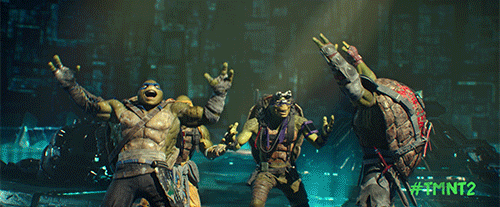
- 🟠 -
Mikey is THE definition of an extrovert
Suprise, suprise.
I keep thinking about him making fun of Casey constantly, and his fist bump with Vern, or him working the crowd on Halloween. And his eye rolls at Raph and Leo
Can be annoying af and play dumb, but half the time he knows way more than he let's on. And it's SUPER hard to get him angry.
Would be in a fraternity tbh. And like, seven sport teams.
The world is a lesser place with him cooped up away from it.
He's a HUGE teaser and talker. Loves to flirt and prank and play the vibes.
He's a NATRUAL at it
Give him ONE conversation. ONE chance, and he can get literally anyone out of their shell.
Loves having April or Casey or Vern around. Loves teasing them or harassing them tbh.
The bigger his social circle, the better his life.
Is usually a HUGE buffer between humans and his grumpy, tired brothers.
He would be the LIFE of the party. Would be an excellent host of an event, because he'd be everywhere talking to everyone. Remembering everyone by name and face, introducing people to one another, so on and so forth.
He would have multiple friend groups everywhere he goes, with all sorts of different types of people.
Out of his brothers, I see Mikey having the body count tbh
Also probably jumped into a relationship too soon and got hurt early on. He'll be way more ready for the next one.
He has SO MUCH TEXTING TO DO.
His favorite is snap chat.
The BEST out of all his brothers at reading social cues and body language. By FAR.
Can find something to talk about with ANYONE
He's been wishing to socialize his WHOLE LIFE. So he DO!
Probably the only one that can confront and process trauma in a healthy manner.
Not at all afraid of deeper, more meaningful conversations.
Often finds himself the one initiating deep conversations with people who need it the most (his brothers).
He knows there is a time and place for problem solving. And sometimes you just gotta sit with your feels.
Something his brothers STRUGGLE WITH
- 🟣 -
Donatello might not be EXTROVERTED but he is outgoing.
Second to Mikey, everyone in his family has a close relationship with Donnie.
Super caring and fun and inquisitive with everyone he meets.
He'll be down for ANYTHING. Sports, games, cooking, drives, crafts, working out, adventures or pranks or geeky movie nights.
He might not always be good at INICIATING these with strangers but he loves going along with stuff.
Loves showing people his projects and stuff and letting people use them or have them.
Will be there for his friends the instant they ask.
At a party he'd be in another room having a conversation with two or three people.
But I also see him hanging around girls a little more than guys. Finds the girlies to be easier company than guys.
He's been on discord for YEARS. He had human friends before even Mikey did.
But.
He's HYPERVIGALANT of the vibe
Extreme empath.
He does NOT like confrontation.
A HUGE people pleaser.
Feels he's stepping on eggshells around his loved ones and friends. In an effort to keep them happy.
He's a sensitive guy.
If he's told to shut up or be quiet, especially if he's excited or talking outloud- he's modified. He WILL shut up. For a while.
His brothers know this. While they get exasperated sometimes, they rarely interrupt him.
Does NOT like gossip. Don't gossip with him, he hates it
Makes him feel gross and mean.
Hates when people are upset or sad in any way.
When vibes get rough he does not cope well. Often chooses to avoid or straight up leave.
When things get heated he gets overstimulated quickly.
If he can't leave, he shuts down. He won't talk and if he does it's very quiet
Doesn't know how to help or address emotional things either. He prefers to let it go and just move on, leaving stuff unaddressed.
He's an outgoing and pleasant guy, but he definitely doesn't mix with everyone.
- 🔴 -
Meeting Raphael is a terrifying experience.
Because he talks and looks at you like he hates you already.
But he doesn't hate people.
He just sucks at them.
Raph wants a normal life just as badly as Mikey does.
Raphs love language is harassment???
He shows his love by annoying his loved ones. Or through teasing and banter. Or wrestling his bros to the ground or pull them into rough hugs.
However
When he meets new people he isn't there to make FRIENDS.
He's there to let you know that if you bullshit with his family you're gonna get whooped.
So he will posture and glare and tower and maybe even roll his neck or crack knuckles to anyone.
Literally anyone.
Remember how rude he was to April?
So when he can't do any of that- no banter, no pranks, no wrestling and no INTIMIDATING-
He is COMPLETELY at everyone's mercy
Put him in a group of girls, or take him to a party or a bar. ANYTHING out of his comfort zone.
He's very awkward.
Only because he's kinda quiet
And honestly SUPER shy.
Wants to be liked SUPER badly.
He doesn't know how to make friends. At all
Flirt with Raph. I dare you.
You'd terrify him
Is the type of guy at a party to stick to the side of someone he knows and never. Leave. It.
But he finds out he gets along with blue collar guys the most.
And Raph has this super power
He can detect if you're a good or bad character super quickly. Much quicker than everyone else in his family. Like, one conversation in.
Not that he really believes himself. He thinks everyone's out to get him. or his family
If he's not making fun of you, you know he doesn't like you.
Is the type of guy to have quality over quantity relationships.
Hates texting. Honestly hates social media and technology beyond like...insta reels or something. He doesn't like sitting on his phone or video games all the much. Half because he breaks things easily or gets easily frustrated at leaning how to work it.
Rather be doing something active or working on a car or build something or carve stuff.
Might not be as outgoing as Donnie or Mikey, but if people manage to ACTIALLY get him to do something fun, he is ALL IN and having a BLAST.
The kinda guy to crash at his friends house and just chill.
He recharges when he's in proximity of his loved ones. Not always SOCIALIZING but having his people close.
-🔵-
Our REAL introvert
He struggles to socialize even with his BROTHERS
Who are the only people in the world he allows himself to be even semi relaxed around
A conversation with anyone other than his dad and brothers is the opposite of a relaxing/easy activity.
He's honorable, polite, and formal.
But Leo is and EXTREMLY cold character.
Sometimes even a bit cruel and scary to strangers.
Has a weird habit of wrapping his arm kindly around someone he's about to hurt
Struggles to see even April as more than an 'asset' or 'person dad holds dear'
Doesn't see Vern as a friend. Doesn't see Casey as a friend.
Leo is the only turtle April doesn't have a strong connection to. Not out of lack of trying.
Tolerates social situations only if he falls into a leading (controlling) role.
Doesn't like large groups of people.
Very quiet otherwise.
Struggles to initiate activities with his brothers.
He sucks at it.
He is always receptive to when they reach out to him though
And kinda has a fear of getting turned down. Getting turned down by his brothers makes him sick to his stomach.
Not that he admits it.
He also doesn't handle rejection with any grace. Gets just a LITTLE pushy to make you either feel bad or like he's in charge
His brothers still gotta tolerate him being a little bossy and stuck up and a fun-sucker while they hang out with him. They know he can't help it.
But Leo is super relieved every single time they invite him to do something.
What would Leo be like at a party? Leo never WENT to the party. And if he DID, he'd be outside, trying to soak in the quiet. Listening to the party from out here.
or hug him, or just express somehow they still want him around or like him. Or love him. Because those moments are getting rarer and rarer the older they get.
He's completely alone other than his dad. At least he's thought so his whole life
Would be the one petting the cat. Or dog. Not the type to go LOOKING for it, but if it came to him, he would.
Yes, he texts, but never outside of absolute necessity. Or if his brothers remind him of April's birthday.
He likes to read
Even if Donnie, Mikey and Raph are together in the lair having fun, Leo is often by himself somewhere else.
He recharges alone. He does calligraphy and he sketches SOMETIMES. Little stick figures fighting with space guns or something.
But a lot of what he reads are super geeky stuff. Like star wars novels or manga.
But don't tell anyone.
Splinter is his preferred company. He adores time with his dad. He'll spar and train and talk with his dad often.
Doesn't care about having friends but he wants a girlfriend SUPER badly. More than all three of his brothers combined
Being alone with him sucks if you like to talk. He gives you a LOOK that SCREAMS shut the fuck up.
It takes EXTREMLY specific personalities to get Leo a little soft for them. A quiet person with a good sense of humor.
And the likely hood he'll ever get out to find and meet them is next to none existent.
But hey
Even after like, ALL OF THIS
It's not hard to get Leo to smile
#tmnt leonardo#bayverse#leonardo#tmnt bayverse#my writing#tmnt x reader#raphael#donatello#tmnt#tmnt raphael#tmnt donatello#tmnt michelangelo#bayverse tmnt#bayverse leonardo#bayverse donatello#bayverse raphael#bayverse turtles
1K notes
·
View notes
Text
Some observations about Baldurs Gate 3 that hit too close to home.
After another few runs i will probably just make an in-Depth Character Analysis for every character simply because they are good reflections of actual trauma-manifestations and how abuse can manifest in people. They are also so well written that it serves a narrative purpose to explore all the material that is out there about them. I am also personally cursed with actual medically-relevant levels of Empathy and Hyperfixation; so writing this helps me put a pin in it and move on.
But so far here are my highlights
(SPOILERS and obviously content warning bc these are deep)
before you ask; i have almost 300h in this game.
You have to convince Shadowheart to eat the Noblestalk. She actually stells you she rather get her memories back from Shar but when you hit the persuasion or intimidation (what the fuck) check to get her to eat it she'll tell you about her childhood friend. Not her name, not her parents but her best firend. Possibly because she has had a closer bond to that person after being abducted and indoctrinated. With her believing herself to be an orphan, she would've looked elsewhere for comfort and sought out her own family, this is why she falls hard and heavy for Shar and builds the backbone of her indoctrination. She is literally ripped out of her home & given a new identity to server her from all she has known. Religious indoctrination, Gaslighting, Abduction, being forced to let go of your personality are her main themes.
There is a scene out there floating around in which you see Astarions pespective of the night when he bites Tav for the first time, in his meditations he is confronted with the rules Cazador put on him, including that he can't eat intelligent creatures, can't be away from Cazador unless allowed to, has to obey every command and that they are should know that they are property. Which in turn means that Astarion literally didn't just have any autonomy, he was objectified (and not just through seductive/sexual measures) and that is really the crux to understanding why he doesn't believe in kindness, but rather shows self-serving behavior in most cases. Since we know that Astarion was extremely young for an elf before he died and became immortal (literally stopping the aging /maturing process) it is also very telling that Cazador constantly calls him brat, boy or other very juvanile names, refering to them as a family... well it is also the story of a very controlling parent. Themes of (Bodily) autonomy, infantilization ( & puer aeternus, forever-child), slavery, depersonalisation, corruption of life and torture to break someone.
Gale isn't just a guy hung up on his Ex, but also a victim of abuse. In this case a power imbalance none of us can fathom; She is described as being a jealous goddess and rules over the domain of mysteries and magic. So with Gale being a Wizard, she is literally his boss. He admits that he was foolish enough to aspire to be an equal to her, but she is so jealous that she tells him he can't really be worthy as long as he takes breath. She could just take his powers away and be done with it, that would be more than enough punishment for a guy who literally made Mystra and her domain his life's purpose, but she rather makes him do it himself. Add to that, that she literally only tells him this after years of self-isolation (after he put down so many wards that he could've blown up a whole army as he says if you click the right dialogue) to really fuck him up well. He also talks about death pretty much constantly, not surprising giving your situation, but he will tell you that he will kill himself at several points in the game, for instance after he comes clear about his nethrese orb. Themes of romantic abuse, power-imbalance, toxic work enviorment, self-isolating behavior, suicidal ideation
Wyll ... well from the looks of it he is the most well adjusted of all the companions (my opinion) but he has something that i'd describe as the "eldest daughter"-syndrome, more commonly known as parentification. This pattern usually occurs within single-household parents and is commonly described as a parent looking to their child for emotional or practical support, rather than providing it to their kid. We meet Ulder and see that he talks over Wyll a lot, not listening but expecting him to follow the standard he sets for him. That is also why Wyll repeats his fathers words like gospel (because this is what, in his mind, fullfills the expectations bestowed upon him) and why he loves fairytales / bard tales so much (because they are an ecapist view of the job he set out to do) Ulder literally exiled his teenage son because Wyll did the only thing he could to save an entire city, by sacrificing himself. Thats a lot to expect from a 17 year old - even more so, he doesn't stop with the heroics. He expects himself, as a human who hasn't even reached the age of 30 to hold up to mystical creatures such as Astarion or Karlach, or even Gale who is a accomplished Wizard. Themes of parentification, escapism, self-harming through putting himself in danger, chronic-self-sacrifice
In plain words; Gortash, Karlach's Idol sold her to a Devil. But add to that that she must have been pretty young when she was sold (late teens to early twenties possibly) and being that if you play as a Tiefling, you face a lot of predjudice she was likely forced into that position as well. Starstruck she was, with a juvenile naitivy that Gortash used. Appropriately, as he is the chosen of Bane the god of "tyrannical oppression, terror, and hate, known across Faerûn as the face of pure evil through malevolent despotism" (Source: Forgotten-Realms Wiki / Bane) So she pretty much was raised in a toxic enviorment, which forced her to become a killing-machine, first figuretively, then with the extraction of her heart, literally. Themes of slavery, oppression, misuse of trust, being taken advantage by a more powerful/older(?) person, being drafted.
Jaheira - to be honest, you need to know the lore of the previous baldurs gate games or just listen to her dialouge, ask her all the questions. She is a war-veteran against Bhaal, the good of ritual murder, and has a long history of fighting to achieve some sort of balance of power. She lost her husband and several close people all to this, or any other war, but due to her wisdom and strength people look to her for guidance. Themes of: Survivors Guilt.
Halsin - he is really closed off at first but then just casually hits you with "i was captured in the underdark and spent 3 years chained to a bedroom wall by a pair of drows who used me as they pleased". He is reprimanded by some of his druids for leaving the grove as soon as opportunity struck, just to get back and leave the next day, and if you talk to him about his position in the grove he is actually very forthcomming. He actively holds himself back; indulging in simple hobbies because he knows what lies within his heart. He is afraid of himself and his potential (canonnically he can't control his wildshape, which is very weird for an ARCH-druid) Themes of: impostor syndrome, avoidant-based self-harm, sexual opression, loss of control, emotional regulation.
Lae'zel is a very tragic case, and one that closely resembles the stories of Shadowheart and Karlach. Her entire existence is based upon a matriachial war society allowing her to live if she proves she can be of use and that in a culture which only values brutality, dominance & service. All of that culimating in her finding out that her oh-so-beloved Queen is actually just an imposter, and that everything she has lived for up to that point is merely political propaganda created to make her, and the rest of her entire species, willing pawns in a war that has no longer bearing on their survival alone, but is fought to justify Vlaakith's (the reigning monarchs) personal ambitions. Not only is she forced to reconcile that she is turned into the thing that controlled her kind for hundreds of years, that the only cure she knows of would kill her and then on top of that, that her hopes and dreams were lies and that she is now the Nr 1 enemy of the person she has served with all her being. themes of: oppression, propaganda, casual violence, objectification, child-warfare, eternal warfare
Minthara in short, her story is about being shamed for growing up in the same scenario that Lae'zel grew up in. Lolth, the god of the Lolth-sworn drows is a crazy queen who values scheming & backstabbing so much and is so volatile that you can't know what to expect of your deeds (and i mean it; there were people who were appraised by her for scheming against her, but also those who were killed. It's almost random.) She considers Lolth to be cruel and abandoned her for the Absolute, only to then be used and abused the same way Lae'zel has. Not with promises, but erasing her memory and exposing her perceived weakness. Themes of: casual violence, violent culture, her own ambition colliding with her desire to be safe, being a pawn in a larger game.
#baldurs gate#bg3#baldurs gate 3#non-witchy#baldurs gate iii#baldurs gate character#background to baldurs gate 3#character analysis#analysis#fan theory#media analysis#astarion#wyll#karlach#minthara#halsin#jaheira#lae'zel#gale#minsc will have to wait#im sorry its so long#yeah some characters are a bit more shallow#i will go in depth sometime#dark urge has a grip on me i swear#please do yourself a favor and look up the earlier 2 games
2K notes
·
View notes
Text
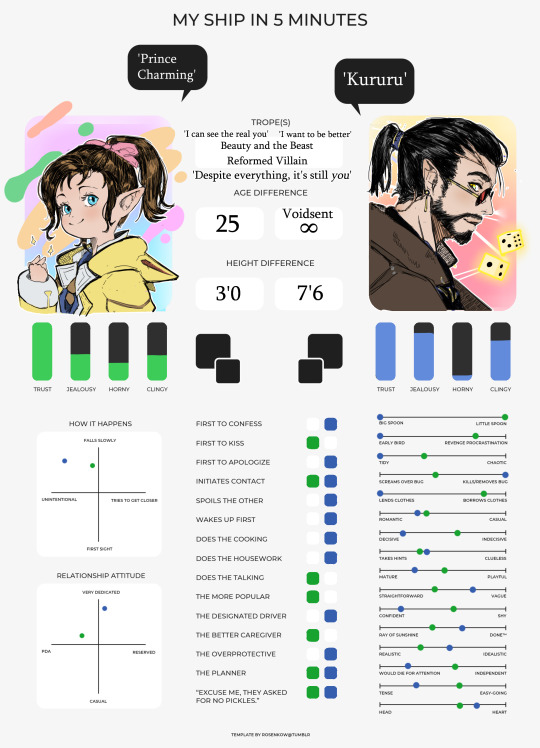
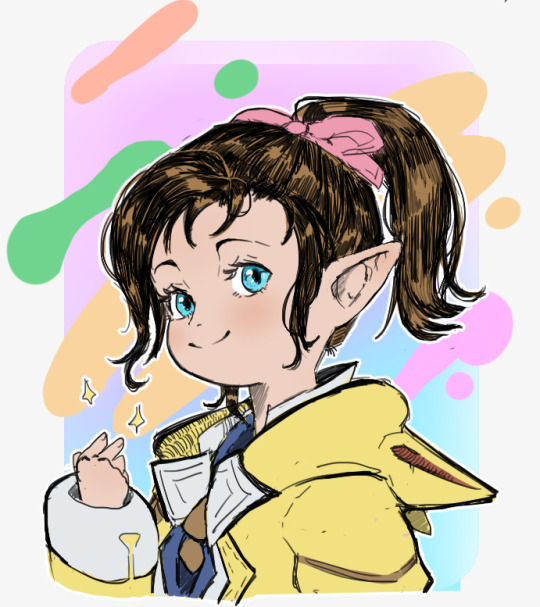
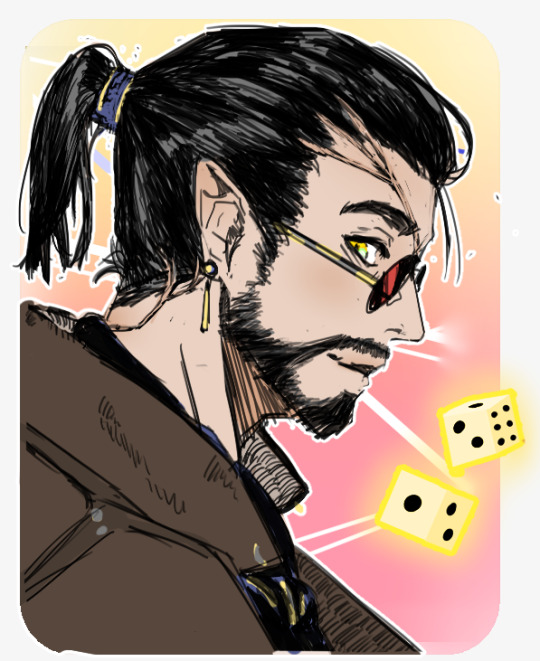
I'm coming out of hiding about this cause I'm so fucking anxious about sharing this info about Silvaire Canon, but uh!! Sil's canon ship is with Krile!!
I'm anxious cause of the types of reactions that come with ships with lalafells and any race that isn't also a lalafell :( But! For a longstory short of my brainrot with them, Silvaire through most of the MSQ is still 'a voidsent' or technically a 'villain' type character, working behind the scenes to play multiple parties (reasons usually literally just to cause problems for the WoL to force them to grow as a person so they they'll be a 'better meal' down the line.) Though the longer he stays with the warrior of light the less atherical imbalance he has from his voidsent/darkness affliction and the original person he was (the warrior of crystal from ff11) comes through more as he is a good person deep down! Krile, is the first person to clock him on his behavior and see through the way he acts around people due to her Echo! She can read his intent and tell if he's lying, as well as see the unnatural traits (slitted eyes, sharp teeth etc etc) that are hidden from those unblessed. She's the main person who starts correcting his behaviour by giving him consequences for his attempts to distance himself from others by seeming 'untrustworthy' - as she can tell that he's never doing anything maliciously or to be cruel to the WoL or Scions. It's a very nice slowburn relationship! As Silvaire recovers his soul through the process of healing from his traumas (Shadowbringers is the main point he starts becoming a person again cause of his direct confrontation with Emet, and then post Endwalker dealing with the Thirteenth and the potential of fixing his original home) and Krile is a good support to that, as unlike the scions, she's not as quick to mistrust him (or in Thancred's case to fight him on most things) as said before she can sense his intent for what he does, and as he gets more of his 'soul' back, she's the first to offer that olive branch cause she believes him.
There's so much more!!! Honestly!! It's a long goddamn narrative for him, hence him having an entire Google Doc Lore (Covering his original ff11 Lore + The Hound of Garlemald + post > Actual game lore) but someday I'll have it all written, and by that point it'll be a novel in itself. But uh! Yes! I've always seen @starrysnowdrop's content and it eases my heart of worries for the affection I have for the relationship and the development I've done behind the scenes \o/ Inspiration to overcome my phobia's to talk about it in general as it were! The Gposes and Writing that they do is always beautiful!!! And heartwarming!! \o/ Give them a looksie! Their work is wonderful! I wouldn't be confident to post this without seeing them on my feed. But ya! I'll be doing more content of them now that I'm not being fearful of it! Cause they're important!! And I'm a sap!
Thanks for reading and while it's none of most people's business I will say that the relationship itself is emotional attraction top of all, and sexual aspects are not the focus of this narrative >:( Lalafell are adults who can have fully established relationships and 'sex' isn't an end-all-be-all when exploring character dynamics. The deep emotional connection and trust of secrets and feelings, as well as providing comfort from so many trials!!! Sorry rambling again. I care them very much!
#[I drew/filled out this chart months ago and never shared it beyond a few friends I am a very nervous person]#[They're important to me your honor!]#[I've adored Krile since I met her and the slow development of the relationship over the years has given me so much]#[Sorry for tagging you as well! I just hope people may look to your content as well o/]#[mun art]
44 notes
·
View notes
Text
The existence of an afterlife in BG3 has fuck all to do with whether or not Gale's feelings and actions around Mystra are valid or not. I saw an anon somewhere else and lost them but I want to be very clear. Arguing lore is secondary (and beyond) to me, behind being bare minimum trauma informed, empathetic, and GOD HELP Y'ALL, LITERATE...
When you are groomed and abused, inside or outside of institutions, always within some system that has enabled (intentionally or otherwise) that abuse, your abuser is at least psychologically to you omnipotent. They are judge, jury, and executioner. The weight of their displeasure or contentment, the fear of their ire, replaces your conscience.
It does not matter whether or not you personally believe Mystra has a certain level of power, Gale's connection to magic is or isn't threatened, the surrounding academic and religious structures are or aren't directly involved in grooming people. That has squat to do with the reality of abuse.
If you are trying to find loopholes in Dungeons and Dragons lore to spend your time arguing that people should hate a character you hate for processing his abuse & talking about his abuser in the Confront Your Abuser game, you are a dickhead.
#gale of waterdeep#gale dekarios#galeposting#bg3#bg3 meta#i guess???#media matters#like i swear to fuck#what hypothetical trauma olympics are y'all in#with invented characters#who have both main quests and side quests#not to mention in game lore via books rumors etc#that make it so clear to you that the shared experience between characters is at minimum violent coercion#you need to get a journal and or a groupchat#pls be ugly and wrong and hateful in your living room#in private#jesus chriiiiiiiiist
96 notes
·
View notes
Text
thinking again about sora and kairi mirroring each other (see my previous posts and tags 1, 2)
currently thinking about it in the context of their "others" though. initially I was thinking about how the wayfinder trio did a bait-switch where you think ventus is the sora (because he's part of the heart hotel, and he looks like roxas who is a sora, and his name literally means wind) and aqua is the kairi (she says the same line kairi does when waking sora/ventus up, her name means "water" while kairi means "sea," and she's the "girl" — gender neutral — of the trio). but in actuality ventus is the kairi parallel and aqua is the sora parallel.
this happens a lot too with the others. namine is kairi + sora (+ ven, who is essentially also a bait-and-switch sora and kairi). xion is sora + kairi. ventus is a sora-but-actually-kairi parallel. aqua is the kairi-but-actually-sora parallel.
they have the same battle stance and animation in remind. the final world is literally the sea-floor mirroring the sky until it's just one huge world of clouds. even the paopu exchange is them mirroring each other's pose. like, I really do wonder if this meshing together is deliberate, you know? I think often we see their relationship as "sora coming home to kairi" with kairi being the lighthouse or the guiding light, which isn't incorrect per se, but I just want to explore an extra layer to it I suppose, by looking at the one parallel where they both differ and become foils of one another: the year-long sleep.
kairi slept for a year and woke up having already confronted the memories she had to sift through, accepting the reality that the present truly is different now from the past and she can't just change things back to how they were before. they can't undo sora's death; they'll find him and bring him back to the present. as much as I hate that she's still in her training arc, at least she gets to choose who trains her and which direction she'll be taking (aqua makes sense imo, and maybe kairi and ventus and lea would be then ones bringing the mobile games lore to the present)
which is the opposite of sora's arc in com. sora slept for a year and woke up "unchanged" without really confronting any of the memories that he had to sift through, with all his ideas about his friendships and trauma going pretty much unchallenged
I'm also thinking of that jp translation of the tunnel scene which has sora remarking that kairi is (herself) strong, as opposed to the en localization of him saying he's strong when he's with her. a subtle difference. it's a shift from kh1 sora asking kairi to stay so she'd be safe and kind of implying that she'd be in the way
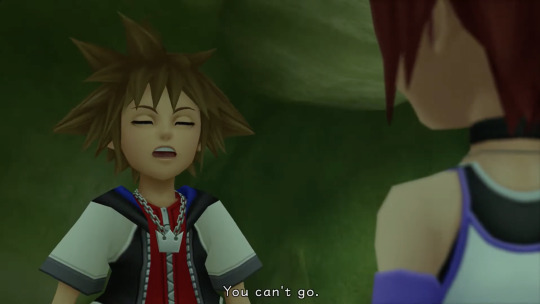
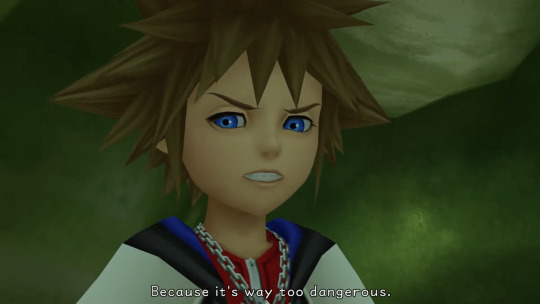
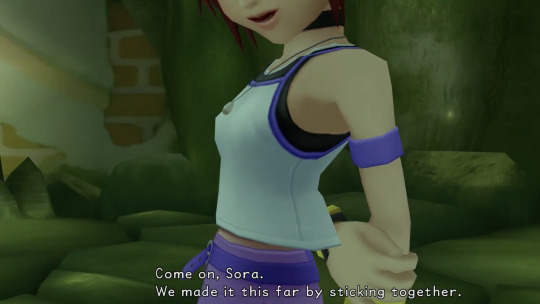
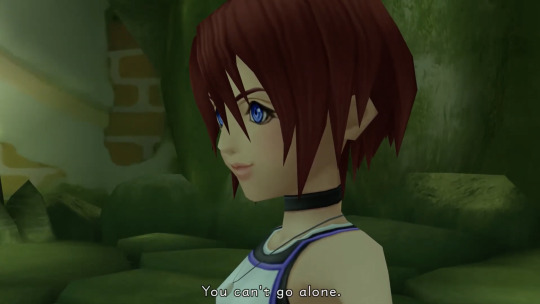
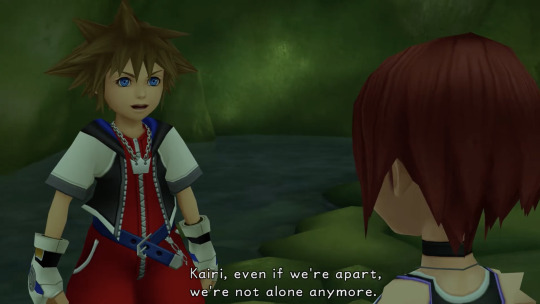
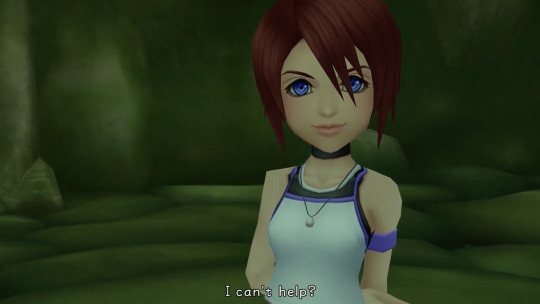
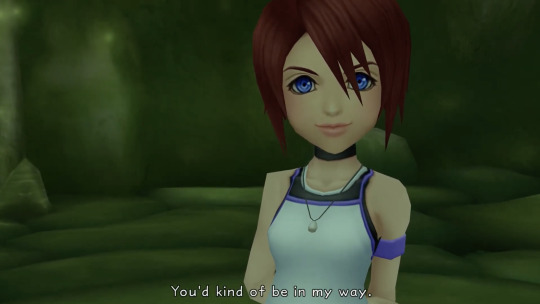
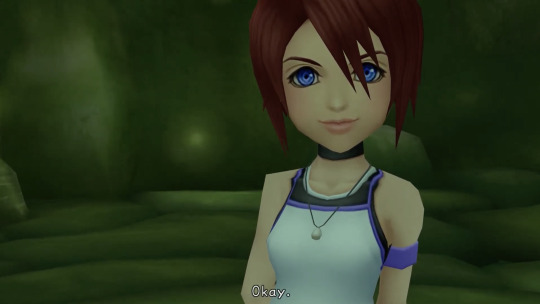
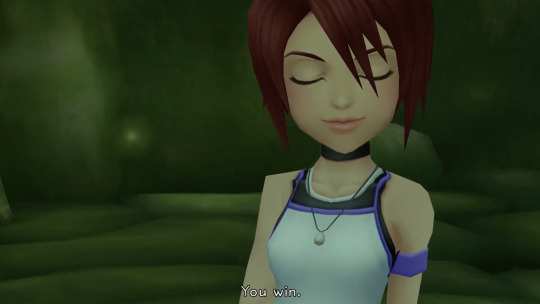
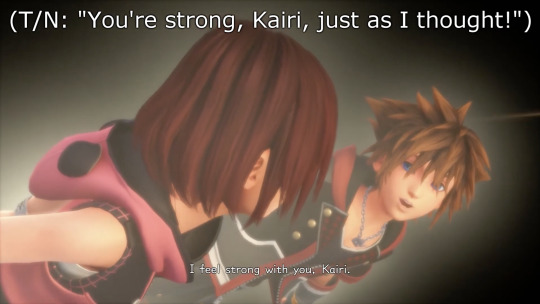
idk, I think there's something to be said about sora and kairi mirroring each other for most of the series and kh3/remind being their physical divergence point (with sora literally going to kingdom hearts purgatory) and melmem being their metaphorical divergence point (with the difference in the way they confront their year long sleep).
now they both have to figure out who they are outside of the pair they make (or trio they make, with riku). they're peter pan and wendy when wendy still wanted to stay as a child, but it begs the question: who's the wendy in this situation who wants to "grow up" between them? I used to think it's sora (since he's the one who goes on adventures while kairi stays in destiny islands) but after watching the melmem cutscene and thinking about how sora has shown over and over that he can't process his hurts/trauma... maybe it's the other way around this time. kairi is, in her own way, moving forward (although I wish nomura wrote it better but this is what I believe her character arc is going) while sora is just constantly repressing his own shit, preventing himself from growing. hence why he never learns the lessons data sora did, he keeps resetting to level 1, his anti/rage form just goes unacknowledged, he breaks down in the keyblade graveyard, etc. and now he's truly alone in quadratum. he's never been alone since he was four years old.
in any case, kairi and sora mirror(ed) each other and I'd like to see them develop more as characters when they're apart. kairi making new friends and learning to lead like a princess of heart maybe? just exercising a lot agency, it's all I ask. meanwhile sora learns to heal and believe in his own strength (e.g. learning the second part of ventus's line: "my friends are my powers and I am theirs"). and I think their separation might be necessary for both of them to move forward and "grow up"
kh being about the growing pains of three best friends who drift apart, and they have to intentionally try to keep that friendship together even if it means that friendship isn't going the be the same as it was before. perhaps keeping that friendship together requires accepting that it has changed and it will continue to change. in fact, it must change, eventually
#mine musings#liveblogging kh#kh meta#i actually wanted to talk about aqua-sora parallels lol but i ended up talking about kairi#there's some interesting implications i think because kh thematically encourages balance between “opposing” forces to be the ideal good#but kairi and sora aren't presented that way. if anything they're both “light” (thus far)#or rather sora is seen/presented as “light” but that boy has so much darkness in him that he's just ignoring lol
7 notes
·
View notes
Text
extended author's notes | castling
castling (Lucanis/Rook/Spite, DA: Veilguard, explicit): AO3 link
I wrote one of these notes for another fic, and I really enjoy looking back at a completed project and talking about it. Here's the DVD commentary + my process notes for anyone who's interested below the cut!

An evolving story
castling was written after a 6-month writer's block. I talk a little about it here, but basically, it started out as a drabble that I kept adding on scenes to, and it changed along the way.
The original planned theme of the story was mimetic desire. Basically—do we value a thing for what is, or because others desire it greatly as well? In an OT3 this leads to interesting dynamics that I wanted to explore.
As I wrote and played more of the game, I found my second theme: acceptance of the shadow self. This eventually became the main theme I focused on, so I'll reproduce my fevered tags here:
what if the parts that you've been taught are ugly or wrong your whole life manifested as a literal demon
but that demon also gave you the strength to do what was required to survive
what if your trauma taught you survival mechanisms to keep you alive?
what if someone understood they were as much a part of you as everything they loved about you
what if they loved them just as much as the rest of you
what does forgiveness and letting go look like?
2. Remixing canon
I didn't want to do a straight retelling of the canon Rook/Lucanis romance (lots of authors have done a fantastic job of it! I don't know what I would add!)
The challenge I set myself was to branch off from the "Minrathous is saved" decision point. In this world state, Lucanis and Rook have been flirting gently up to "Coffee With The Crows", before things get messy. I wrote a few guiding statements and motivations:
Lucanis is hardened and becomes avoidant of Rook.
Rook must win back his trust through words and deeds ("Bloodbath").
Spite is fascinated by Rook, maybe even to a worrying degree. (To him, she is Determination personified.)
Spite has autonomy and wants to separate from Lucanis.
Rook reciprocates Spite's attentions. More importantly, she acknowledges his autonomy.
Lucanis cannot tell where his desire for revenge and his attraction to Rook arises from—or he knows but is afraid to confront it.
Spite will never knowingly hurt Rook.
From there, it was easier to figure out the scenes I wanted to write, and everyone's behaviours. For example:
Spite becomes the obvious "wingman", manoeuvring situations to bring him (and Lucanis) closer to Rook.
Rook becomes the more active partner who initiates romantic gestures. There is no "almost kiss" scene in the pantry. Instead, Rook initiates a hand-kiss.
Spite uses "we" in the waking world but "I" in the Fade to refer to himself (special cookies for you if you spotted this :)
"Inner Demons" never happens in this world state. Instead, Spite and Lucanis learn to work together because of Rook.
3. In character
Ada "Rook" Aldwir
Rook's personality is pretty well defined in the game so I tried to stay true to it. ("Heroic nonsense saved your grandson and is rescuing you now.") She is outgoing, intuitive, and direct but ultimately well-meaning. Rook is a Veil Jumper—and no one goes into the haunted magic forest willingly if they love the modern city and systems they live in. (She hints at this in chapter 4, and I would love to explore it in future.) This affinity for the strange and liminal makes her sympathetic to Spite. Rook is more of a cipher in the earlier chapters, but I think she came to life in the sparring scene. The way she fights barehanded was inspired by wushu and the Monk class from DnD, focused on her element of lightning. (In Veilguard, she is a Spellblade.)
Spite
Spite is sarcastic, demanding and mercurial. I took a few liberties with this character, including picking he/him pronouns to add to the blurring of boundaries with Lucanis. Spite speaks much more eloquently in-game in the Fade (in Inner Demons), and I preferred that style. He begins castling by taking over Lucanis, but once he finds equilibrium (through them both agreeing on their feelings for Rook), they start sharing the pilot seat. I knew that I wanted Spite and Rook to have a connection, apart from Lucanis, so the Fade was the natural place to set their "bottle episode". As I wrote about Spite and Lucanis' imprisonment, I realised that for a spirit who was content in the Fade, being ripped away and trapped in a limited form would be horrific. I didn't need to write elaborate, graphic torture after that—the implications for them were terrible enough. (Most of chapter 5 was me sobbing over this.)
Lucanis (I know he's everyone's blorbo, and I'll try not to step on any toes here!)
Lucanis is cautious, charming and kind. I chose to write him not as demisexual, but tied up in knots about sex and violence because of the nature of his work. I didn't want him to be an afterthought to the Rook/Spite relationship. He kept running away so much at the beginning, I was genuinely worried we would have no story, so I deliberately wrote chapter 4 from his POV. After that, Lucanis was surprisingly the easiest character for me to inhabit while writing. He's also such a naturally sweet character that his almost silly overprotectiveness of Rook just happened. I really enjoy the way they both play off each other, because Ada is such a Creature in so many ways, and he's simply moonstruck. It's one of my favourite dynamics that appears in my other stories as well.
4. Recurring motifs I enjoyed discovering
Not all of these were planned, but in no particular order: the knife to the neck, electricity, spirits/angels and demons, small repeated gestures (a lover's vocabulary), awareness of the breath, restraint/self-denial as torture, hand holding, the body as both a site of violence and pleasure.
5. In closing
If you made it all the way down here, thank you for listening to me ramble! I hope you enjoyed reading castling as much I did writing it: I learnt a lot, and I exorcised a lot of hang ups about my work in the process. I definitely have thoughts about how to improve the story (crucially, the Lucanis/Spite relationship is missing here), but I'll take that energy into the next piece.
I realise most of this is about the "framework" of the story; if you'd like to know my thoughts around any particular scenes please feel free to send me an ask anytime <3
#dvd commentary#complete self-indulgence#spite dragon age#ada aldwir#lucanis dellamorte#my writing#dustdeepsea fic: castling
9 notes
·
View notes
Note
so, apparently there's plenty of death symbolism/metaphors surrounding, are you interested in elaborating that? including "indirect" death like spiritual death, character assassination or death of identity, somethjng along those lines?
- death symbolism surrounding Taichi, sorry, somehow I pressed ask , sorry for my blunder
It's fine, no worries, I already assumed that it was referring to Taichi! If you think about it, several characters in Digimon Adventure have been dealing with the subject of "death" one way or another, most in direct association with someone (human or Digimon) close to them.
Now, if we look at our favourite main character, riddled with traumatic childhood experiences and questionable coping mechanisms, there are a bunch of instances where he had to deal with the potential of death happening in front of him or CAUSING death himself - either to others or himself -, so it should not be surprising that, at some point, he may have dissociated himself (mostly subconsciously, I'd say) from being a Chosen Child. Whiiiich may or may not have led to Kizuna's events, but yeah, it's count the instances first, shall we. TW: death, mental health.

The whole Hikarigaoka incident: While Hikari was scared too, she was still much younger than him and couldn't grasp the implications of what was happening there, while Taichi did EVERYTHING in his power to protect her and himself from not getting crushed by the two Kaijus in front of them.
Him almost causing Hikari to die due to his (still existing) sense of childlike innocence: Yes, she was sick, but he thought she was already on the way to recovery and only took her to play football to cheer her up. That's where he first had to face that good intentions don't always lead to positive outcomes...
The SkullGreymon fiasco: Again, he intended to do good for the sake of the group, but overlooked the bigger picture and became reckless, thus causing his partner to evolve into a literal symbol of death and decay in the process. Something that may have happened to the ENTIRE group if the Digimon hadn't run out of energy...
The electrical fence and its aftermath: This one has several follow-up points, but I still think it's suitable to summarize them all here - first of all, there is him being confronted with the idea of actually dying by getting electrocuted after he was 100% convinced that nothing they did mattered, since they were "just data in a computer". Once again, he was being reckless and careless - not only did it lead to almost killing himself, but in extension, also dooming Sora, whom he failed to save. Overcoming his cowardice, finding his own sense of courage eventually led to victory - but also led to him disappearing and roughly 50% of the remaining group ended up thinking that he had actually died in the process. Meanwhile, he was back in the real world and had to choose between saving only himself, or everyone else as well... And we all know how the answer to this turned out to be.
Him almost causing Hikari to die AGAIN: Of course there have been several instances of death before and after they re-entered the Digital World again, leading to the eventual "fallout" between Taichi and Yamato in regards to how they should deal with the immediate danger at hand... But the most devastating instance here was Taichi reliving his early childhood trauma, fearing that, by taking Hikari with them, he made the same mistakes again, acting thoughtlessly, not considering the circumstances... He has been acting self-sacrificial for the sake of the group before, but it's this arc that shows that he is actually ready to die if he can at least manage to save everyone else in the process (hence why he ended up fighting with Koushirou as well, because Taichi forbade him from taking on any pain himself and Koushirou was having none of it).
Let's not forget that, during the events of Our War Game - and all the follow-up movies, especially Diablomon Strikes Back -, he was also under immense pressure: To save the entirety of Tokyo from getting blown up by a missile and every other side-effect that Diablomon may have caused in traffic or elsewhere... And once again, his own hotheadedness may almost have caused his partner to get killed, to the sense of guilt plays a huge role in here as well...
02 portrays Taichi as matured, it showed that, while he still occasionally needs to get reminded of it, he KNEW that he has to make uncomfortable decisions sometimes; of course he almost despaired when his partner was being captured and corrupted, but he also realized that he may have had to sacrifice him for the greater good; he needed to remind Hikari that the new kids never had to deal with the same kind of death exposure before, but warned her - with quite a grim, but serious expression - that they would have to face it eventually. He grew aware of their duty throughout all this time, through all these experiences, and it's not pretty, but at this point, he was still ready to act.
Tri picks that point of the story back up again by mirroring Meiko's fate with his own - at least to some degree. Once more, they had to face the possibility of having to kill a beloved partner Digimon and at this point, Taichi was questioning whether or not recklessly sacrificing infrastructure and lives for the sake of fighting was the "right way" to deal with everything. It may have felt a bit like recycled conflict at this point, but it's been several years by now, and Taichi is, overall, contemplating his life choices, contemplating his diplomatic future, the status quo AND his "duty" as Chosen Child.
It's through the course of Tri that he: Watched parts of the city get destroyed ONCE AGAIN, almost died through the course of several fights and an earthquake-like blow, had to witness his teacher - whom he greatly looked up to - sacrifice himself, covered in wounds and blood, to save him AND their missing friends... And all that after Daigo told him that they lied to protect them and that he should move on and create a better future... Thus, Taichi decided to go for the kill again. Again, he didn't like it, again, he got reminded by Hikari of all people how terrible it all is, but he knew that he had to.
Kizuna chose a similar premise to Meiko's once again - first of all, if we look at everything above, is it really surprising that Taichi probably developed some fatigue? We all know, see, can tell how much he loves Agumon - hence why he did end up horrified by the prospect of losing him. And as I pointed out before, he did use the fighting for the sake of having a purpose, because... Who else was he if he couldn't "lead" anyone anymore?
And since the rest of his young adult life was pretty directionless... Can you really blame him for it? The amount of nightmares, the tiredness, the PTSD the previous experiences may have caused in him could never be treated by a "normal" therapist - who could ever relate to all of these things that sound incredibly supernatural and like nothing an adolescent should have shouldered all by himself? Heck, he isn't even able to talk to his friends about it at all (even if stageplay!Agumon told him to!), just swallowing it all by himself, dealing with the thought spiraling in his head on his own.
Hearing Menoa tell him that she lost her partner, making it all sound like a huge punishment for making the wrong choices... It may have rang several alarm bells in Taichi. How often must he have dreaded making the wrong choices? How much guilt must he have felt for the sake of Hikari, Meiko, Daigo, everyone he temporarily let down by hesitating or acting out in the wrong moment, let it be Yamato, Sora, Koushirou, Daisuke... Now there's this young woman who asked him to figure out a way to fix a problem she couldn't herself, a problem that may separate him from his soulmate forever and for what? Because he grew unsure of himself, because he faltered, because looking at all his friends, who found their paths, had become painful and tiring. Because, even after coming to temporary answers, he didn't know who he was and who he wanted to be anymore.
He had to choose to fight so many times, he sacrificed himself as much as he could. Then there was the prospect of fighting Menoa with two possible outcomes: losing would lead to his own death (or "loss of self" since he would have his consciousness be trapped forever in a neverending dream of his childhood), winning would lead to the death of his partner anyway... It must have been dreadful.
When it comes to the different kinds of "deaths" you mentioned, I will try to summarize this quite shortly, even though they're definitely interesting angles.
I believe that a "death of identity" is basically what I have outlined above - while it mainly focused on Taichi's (decline of) mental health, which may also have resulted in a tendency to isolate himself, Taichi's journey is basically some kind of Lion King analogy, where he starts as your typical head-through-wall protagonist, but has to deal with the aftermath of cowardice and the consequences of his choices - and does so by running away from the pain FIRST. From himself and his responsibilities. He also could have chosen to let Menoa win and let his consciousness be turned back into that of a carefree child... But he chose not to let that happen.
Because deep down inside, there IS his path. There are his values, his persistence, his belief system. He's been on the brink of a breakdown, but it's all there. Hence why I really, really, REALLY want to WATCH him getting to his "Simba strikes back" phase at some point, since we only ever saw it implied by the end of each, Tri, the stageplay and Kizuna. We KNOW he will push back, but we have yet to see in what way, if he ever got therapy and how he's actually doing - mentally, physically, spiritually.
Speaking of which, "spiritual death" is a bit harder for me to grasp in his context, but considering how his sense of guilt and fear of cowardice have led him to (temporarily) turn away more and more from his true self, his natural sense of courage and more positive, outgoing attitude... It all leads me back to him having lost his sense of self. I will never forget the feeling of how my stomach dropped during the "depressed adult" scenes in Kizuna. Again, I want to give this movie props for depicting adulthood like that, but it really hurt and felt way too relatable.
And I guess in this sense, we can also talk about "character assassination", because... As you may have noticed, I have linked quite a few analysis posts in this answer, because I have been trying to analyze and understand Taichi for MONTHS now. And sometimes, I feel like I may be trying too hard - who knows me also knows that, while Taichi is one of my favourite characters, I also have my fair share of problems with the AMOUNT of Taichi suffer p*rn in the OG timeline (and I still maintain they only made Taichi as generic as he was in the reboot to avoid these allegations). Some may argue that it's all over the top and that they keep recycling the same conflict (for him and in general) over and over again for the sake of even HAVING a plot to revolve around (which also wouldn't contradict the epilogue too much and actually leading towards it eventually).
For me, it has been interesting to look at all of this in context, as heartbreaking as it is sometimes. Mental health is a serious issue and watching a character like Taichi experiencing at least some form of implied depression after everything he went through tells you that everyone can get affected by this. Even if your experiences won't involve several instances of near-death-situations, even if you are resilient and have a lot of social, mental and physical resources to deal with set-backs or intense, difficult situations... It may still happen. And it's important to show that there are ways to deal with it as well as you can. That there is hope, even if things are not 100% alright.
24 notes
·
View notes
Text
Below is a reply I wrote elsewhere to someone who said they were present when the Austen run with Lorna in the 00s was going on. According to them, everyone hated Lorna, and there was no way to root for Lorna in any of the Austen stories until people "in retrospect" learned of the Genoshan genocide (which as I note below, readers would have known back then - New X-Men 132 was before Austen's run).
I'm posting it here because I think these things need to be kept in mind when reading Lorna stuff of the era, and when seeing people talk about it.
I wasn't there. I learned of Lorna in 2009, after everything transpired.
But as a Lorna fan who's got decades of media consumption under his belt, that dealt with similar situations in other communities, it's time for me to say something about this. And I'm going to start not with Lorna or X-Men or even Marvel, but with something else I'm a huge fan of that I dealt with.
Before Lorna, my favorite female character was Rosa Farrell from Final Fantasy IV. Unlike Lorna, I had been a fan of the character ever since the game released way back in 1991 on SNES as FF2. Why did I love the character? Because she was a caring badass. She crossed a desert to warn Cecil about Baron coming after him, and made it by herself, only coming down with Desert Fever which anyone could get! She helped Rydia get over her fear of fire with empathy that Cecil and Edward couldn't give! When Fabul was attacked by Baron, and Kain and Golbez almost killed the entire party then and there, Rosa sacrificed herself to save them and trusted Cecil to come save her. Her willingness to forgive and see good in people led to Kain helping them in their final fight. And when it came time to actually go to the final fight, rather than waste time arguing with Cecil, she stowed away on the Lunar Whale and confronted him about his sexism ("chivalrous" though it may have been intended) when it was too late for him and the others to keep her out of it. And then you factor in the gameplay and she's a literal lifesaver.
That's... not what most people I ran into online saw two decades ago. Because they didn't bother to pay attention to the story, or think it through. To most people I ran into, Rosa was nothing more than a weak damsel in distress who undermined Cecil's mission twice and had no depth to her beyond "loves Cecil." I saw a lot of people insist the game would have been better without her. Many of them also didn't realize that Rosa was THE template for caring female white mage lead heroines from FF7 to FF10 - another issue that meant they didn't see her unique traits, considering them to just be "typical white mage traits." So even though Aeris, Rinoa, Garnet and Yuna each had more damsel in distress scenarios with causes less understandable than Rosa's, that they had other aspects built on meant a lot of people didn't hold that against them like they did to Rosa.
In short, there was nothing wrong with how Rosa was written in the original FF4. She wasn't this frail weak flower who constantly needs saving that people made her out to be. She had more depth than that. People just lacked media literacy and rushed to judging her negatively.
What we're talking about here, with writing of Lorna in the Austen era? It's the Exact. Same. Thing.
She had JUST experienced a genocide. That is NOT something that was retroactive. Anyone with a sliver of media literacy, who put real thought into what they were reading and didn't misjudge her by past depictions, should have kept New X-Men 132 in mind. You don't need to see the explicit scenes of her watching all those millions die to understand that this woman who was just pulled out of the ruins, naked and suffering from the horrendous trauma of a genocide that she had to keep reliving as her powers replayed those final moments over and over, is going to have some issues. She's going to have trouble processing the pain. She's going to have mood swings. She's going to look for ways to ease the pain, she's going to react strongly to perceived threats. Not everyone who experiences trauma does so in the same ways. There are many ways of expressing trauma, and many paths to healing.
It's not Lorna's fault that people back in the 00s refused to acknowledge that trauma means something. It's not her fault that some people had their heads in the sand because they wanted her to go back to their nostalgia-laced ideas of her that say she's not allowed to have a trauma reaction where she reacts in any way other than "I need a man to comfort me." I will grant two (2) missteps. One, when Havok left her at the altar, Lorna should have been blaming and going after Havok - not Annie. It was Havok's choice. And two, maybe Austen should have been clearer about how her behavior was a result of processing her trauma from the Genoshan genocide.
But then again... Austen did that. When he explicitly showed flashback scenes of Lorna during the genocide itself. In other words, he took what people should have understood from the "gaps" of the story, and because they didn't, he pulled those moments OUT of the gaps and put them straight on the page to try to get people to understand that hey, Lorna's been through some shit, that has to actually mean something or else what's the point of even having comic books. And yet, despite Austen eventually spelling it all out in big bright neon letters, some people still insisted on ignoring the obvious so they could keep ragging on Lorna being written in a more complex manner than their nostalgia.
Far from "rewriting history," this is putting history into its proper context. It's the same thing as archaeologists today recognizing that Viking women did, in fact, participate in battle, and the claim that they never did was based entirely on past archaeologists deciding to ignore context and force their presumptions about gender roles ("only men fight and use swords, women stay in the kitchen where they belong") onto centuries old finds.
4 notes
·
View notes
Text
One last thrust and I'll be free of you. Well...would you? Alright, I have to admit — Astarion was my favourite character from the very beginning of the game, mostly because of his undeniably appealing appearance. Soon enough, however, mere attraction became interwoven with a deep sense of awe for the richness of his character writing. Especially when it comes to the accuracy in depicting complex PTSD. First of all, there's that lovely, classic sarcasm as a trauma response. Whenever faced with emotional confrontation, Astarion always puts on a façade of irony and false self-confidence, while his real feelings writhe beneath the surface. It's not so hard to understand, considering not only the psychologically natural trauma responses, but also the fact that — given his past — he was well-trained to hide any sign of vulnerability, knowing it could be used against him instantly. In fact, he's so deeply entangled in his own performance that, when he finally allows himself to follow his true emotions later in the game, he's completely lost — unable even to name or make sense of what he's feeling. This ties in powerfully with his request — if the player chooses to romance him—to abstain from se*ual encounters for a while. Again, it's not hard to understand, considering that for most of his life, intimacy was never connected to love or trust. It was always rooted in abuse or manipulation. In his mind, love and s*x are entirely separate concepts — and now, for the first time, he has the space to figure out what they truly mean to him. And now, the most interesting part? Even if the player chooses to romance Astarion, they still have the power to reduce all of his healing progress to ashes. I'm talking, of course, about the ascension. If Astarion is allowed to ascend, he quite literally becomes the next Cazador. Without a stronger intervention, the bond with the player alone isn’t enough to undo what was etched into his mind through years of torture — that power is the ultimate path to freedom and safety. (The writers also made an interesting choice by hinting that Cazador himself went through something very similar in his own past — offering the player a chilling glimpse of exactly what Astarion has just become.) As we all know, though — fortunately for all the 'do-gooders' — you can also stop Astarion and help him continue on his path toward healing. However, what I absolutely love about the writing is that it doesn’t happen instantly. Astarion isn’t magically fixed or suddenly mentally healthy just because he turns down power and he does not start volunteering at the local shelter while singing Let it go from Frozen. Honestly, I absolutely love and cherish every moment when he simply says, I don't know, when it comes to his feelings—because that is so deeply, psychologically authentic. Like in the most emotionally breathtaking, deliciously devastating, graphically agitating, and exquisitely heartbreaking scene—when he slaughters Cazador in a fit of hysterical, almost operatic rage, then collapses to his knees, overcome by the most gut-wrenching sobs and wails and then... ...nothing. The emotional aftermath, in that very moment, is simply this: I feel numb. He needs time. Time to process, to think, to even begin understanding what any of it truly means. All the nonexistent gods—I absolutely, utterly love Astarion.
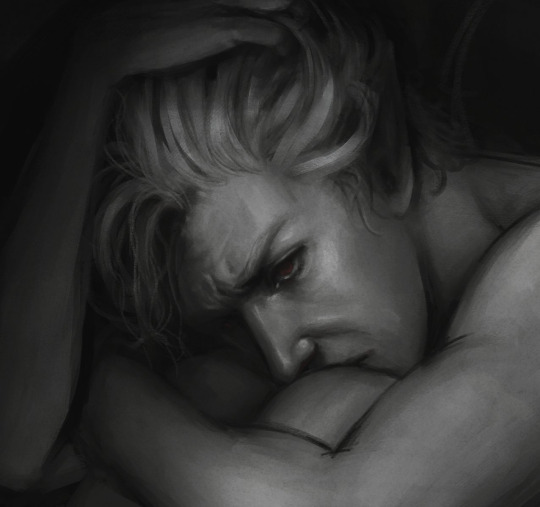
Thats what he looks like when hes hungry
3K notes
·
View notes
Text
Seeing people claiming that 0mori is trying to depict DID and thus no one should interact with it or else they're Bad and Evil and Problematic has like. Just cut a year off my lifespan.
#every day i spend on the internet i become more Old Man Yells at Cloud#editing just to clarify:#omori is a metaphorical representation of dissociative amnesia NOT did#it is literally a game about a character processing and confronting his trauma! that's it! just let it be!#phoenix's fandom rambles
4 notes
·
View notes
Text
UNRELIBALE NARRATORS; SIDE A

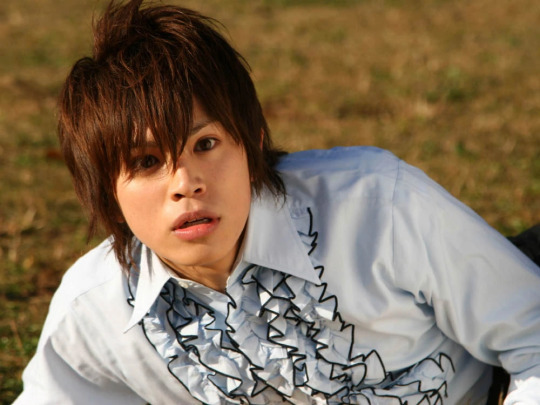
Rebecca Bunch Propaganda:
Okay, so Crazy Ex-Girlfriend is a musical from the perspective of Rebecca. However, a very notable thing which is only fully confirmed at the end is that every single song is from her perspective. Not sure how this applies to songs she wasn't there for, but there's that. The point is, these songs are how she sees and processes things, which often casts her friends as characters/roles. I hate to bring up a song with an explicit version, and I'll bring up less nsfw songs later so you can ignore this (I only added paragraph breaks for this purpose), but a very notable one is I'm So Good at Yoga, which is the first song of Valencia, the girlfriend of the guy Rebecca is trying to get with. In this song, it quickly devolves into Valencia just talking about how much better at literally everything she is, often bringing up sore spots which Valencia would not know about (such as her talking about how her father didn't leave her when Rebecca's did). This is Rebecca casting Valencia into her role in her life, when this role ends up becoming wholly inaccurate later on. Face Your Fears is another super good example of this, even if it's more subtle. The whole song is Rebecca's best friend Paula trying to get Rebecca to just take a step forward in her life and set up a party that could help her get closer to Josh. However, Rebecca ends up seeing this as so absurd due to past traumas regarding running parties (as in her dad literally left the family the very night she decided to set up a party as a child) that the whole situation sounds so absurd to her that it, in her imaginary song, becomes "Go ahead and do the must stupid, dangerous things you can think of. Confront a bear head on, stay in a burning building, run with scissors, just do every stupid thing you can think of". This absolutely was not Paula's message. Angry Mad is one of the songs Rebecca wasn't even there for, but I think it works as a Rebecca pov song just because it's a song which ends up portraying Josh as a simple man who represents every masculine stereotype ever and does not have a complex string of thoughts when he gets upset. Josh is a guy who Rebecca heavily casts into a role that he ultimately does not live up to as a guy who has thoughts not entirely revolving around her. I could keep going on but the whole point is that Rebecca is the source of every song in the musical and unfortunately a lot of those songs are about how she sees others and the roles she's assigned them to instead of who they actually are.
Tsurugi Kamishiro Propaganda (TW; mentioned suicide):
He thinks he's the best and that everyone loves him, but sadly he's a disgraced noble son exiled from the family for being a disgrace. He doesn't even know the "him" that exists is an echo that lives in the memories of an alien who killed and impersonated him. He thinks he still has time to make up for all his sins. He thinks he will be able to live lavishly once again after his estranged relatives decide to call him back to live with them (his parents were also killed by aliens, but only he was impersonated). The first inkling you get of his skewed perception of reality is that he introduces himself as "Tsurugi Kamishiro, The Man Who Will Defeat God With One Slash Of His Sword." I don't think he even brought his sword with him when he committed suicide. He walked into the ocean and never came back. That scene shocked me to my very core because I had believed Kabuto was just fun and games before that happened. Tsurugi had just started to adapt to normal life, too. He had been befriended by the protagonist's younger sister Jukka, and she was teaching him basic life skills. I had hope for that guy, and was rooting for him, despite how pompous and annoying he was. Plus, his combat armor was purple, which is my favorite color (I admit that might have caused some of my favor). His family's butler was really the only family he had left, and that old man cared about him as if he was his own son...
#unreliable narrator battle#unreliable narrators#polls#side a#rebecca bunch#crazy ex girlfriend#tsurugi kamishiro#kamen rider kabuto
33 notes
·
View notes
Text
The Killing Moon Author's Note
He asks if he remembers her.
He doesn’t answer.
There is quiet longing between them in moments when they are alone that Link still cannot place. He thinks he needs time but Hyrule won’t grant them peace. Especially not when there is a kingdom to rebuild and the Blood Moon still rises. But Link doesn’t want to rebuild, he just wants-
(Or, Breath of the Wild 1.5 for those who are tired of waiting.)
Rated E - Post BoTW/ TotK theories - 50,834 words - complete
Read The Killing Moon on Ao3
(Two months later, here it is!) Wow. I cannot believe this story is finally done. I started writing this before so much of what defines me and my life today even happened…I look back at 2017 and the things that used to excite me, bother me, worry me have shifted and changed so significantly…and yet LoZ remains
There have been a few games in my lifetime that have touched me this way, becoming sources of comfort during challenging or stressful times, never losing their luster. (“Seriously, you are playing that again, B?” ) The idea for The Killing Moon came following a frantic explosion of creative energy after I finished BotW for the first time. I didn’t want it to be over. I remember diving into fanfiction at the time, hungry for anything and everything that would keep the story alive.
Then I decided to write a multi-chapter, lore-heavy, character-study of a fanfiction. As my first stab at fanfiction. Because, why not.
I churned out several chapters REALLY fast (I think 9??) and then my life got busy, my attention shifted, and before I knew, it had been years.
I would occasionally think about the story, sometimes making a mental note to go back and delete it, only to forget about it again…To be honest, I was nervous to look back at my writing and get stuck….I had had a vague outline of where I was going that was lost, so all I had in my head was a final confrontation under Hyrule Castle (more on this later).
Following a replay of BotW and the 2021 E3…I decided to do a massive edit, removing chaptering 2-9 completely, and reworking the plot to align more cohesively with what we received about the sequel. The story had a clear endpoint and it took off from there.
Major changes/themes/story notes
[MAJOR CHANGE] the tense:
I switched the ENTIRE story from past to present tense (I am positive I've slipped up here and there…I did not have a beta and, alas, I am not an editor…truly, this was written in the sleepy moments I get at the end of the day when my kids are in bed).
The Killing Moon was never meant bring much resolution and I felt present tense lent itself better to the suspense and tension I wanted present throughout with this in mind. Also, from the beginning, this story has been primarily about Link beginning the process of unpacking some of his trauma. I wanted a chance to deepen my version of Link POV and intensify the complexity of emotions he might face after all he has endured…I wanted to honor the complexity living with trauma. At times, it was meant to feel claustrophobic and uncomfortable and confusing. He is actively remembering his past in this story, specifically recalling personal details no one else can give him. Even Zelda is limited in what she can tell him about himself and as Link says, it feels wrong (even though she would gladly do it) to hold her accountable for chronicling his life. So if he wants it, he must endure it.
[THEME] loss of knowledge to time/making decisions on incomplete information:
I also wanted a tense that promoted unreliability…this story is very much a guessing game. For us (the fandom) with the sequel coming, but also the characters themselves…literally working back from the almost-end of the world where many of the information-keepers died and records were destroyed/lost.
BotW is a post-apocalyptic Hyrule. The “golden age” is long gone. Even the “robust” Hyrule we see in the events of 100 years ago do not hold a candle to what is alluded to exist in Hyrule 10,000 years prior. There is little/no mention of KEY elements in LoZ lore because they have been lost to time, purposely concealed, and then forgotten over the ages.
“Goddess, don't tell me you’ve forgotten your sacred charge? “A pause. “The power without equal. The hidden treasure of Sky Keep? Broken by Twilight’s touch? Fa ha ha…The birth of the Calamity has even faded into myth, hasn't it?...Now give me what I ask in return for the secrets of the Triforce.” (Horned statue, Chapter 4)
In the Killing Moon, first time they have ever heard about the Triforce is from a demon.
This Link and Zelda, in a way, resemble the first version of themselves. They have very little guidance. The history they are working through is incomplete and potentially inaccurate (maybe even skewed by those who recorded it) and yet, they must face destiny all the same. As we saw in BotW, destiny doesn’t wait for you to be prepared.
[THEME] the burden of destiny/ trauma across lifetimes:
Jacob Geller provides a beautiful narration to the theme of darkness in the Zelda series as a whole and does a magnificent job of summarizing what sets BotW apart. “It is a game in which each acre, every abandoned stable and crumbled temple and forgotten spring is a monument to your failures.”
I didn’t come upon this video until very recently, but I feel like it captures the essence of the the "big picture stuff" I was aiming for with Link. The first scene I wrote for The Killing Moon was actually his panic attack in chapter 3:
"Nothing - left of me," he continues in a desperate whisper. He can’t read her face. "If we have to - again," His hands are sweeping in front of him, tracing his broken speech in patterns that feel true. “I won't come back. My body but I-”
A new resolve takes hold of him. He doesn’t need her to just hear him -he wants her word. He’s in her face now. She takes him up in her hands again, and furiously thumbs away the tears from his cheeks. He is supposed to be dead. He whimpers and dips his head down, chewing, chewing, chewing on the words.
"Not-not even sure I'm fully alive!"
To die (I know the jury is out on whether he actually dies or not, but in The Killing Moon, he does die 100 years ago), come back without your memories (essentially the stuff that make us who we are), into a world that has seen generations since you closed your eyes, and be thrust back into a destiny you have already failed…and then the WEIGHT of your past lives…thinking about the overstimulation alone breaks my heart. I feel it in my gut.
Now that Link has finally done it, “completed” the task he was charged with 100 years ago, what happens to the weight of duty when the war is won? What happens to a weapon? Does he get put on a mount somewhere, too? Does he turn to dust?
He can’t even figure that out because of the inescapability of his fate. In the first chapter, he is called to destiny a THIRD time in a single lifetime.
He is also trying to make sense of this with another person. Someone he learns he once loved, who still loves him, who he understands has danced with him in these roles over many lifetimes.
Is there any part of this soul that is his alone? (Chapter 7)
How much of this was manufactured? Does that even matter to him now? Can he allow himself to have feelings? In BotW, we learn 100 years ago Link felt so burdened by duty, he stopped speaking (in The Killing Moon, it is a total loss of the already very little verbal speech he had as an individual who is/was selectively mute.) Now, faced with another “calamity” of sorts, it is his feelings toward Zelda, in particular, he struggles with. And she as well -can they allow this when they know what is at stake? There is a push and pull intentionally through the story, the impact of severely ingrained GUILT for wanting more than what they are destined for. Wanting each other more than anything.
“This isn’t the first time I’ve heard stories about your travels, all you’ve done for everyone else since you woke up. It doesn't feel like my Hyrule anymore. It feels like yours.”
“It can be yours, too.” His voice frays at the end. He sets his hands on her thighs. Something burns in his throat.
“It’s OK. I’m at peace with this. Really, I am. I will do everything I can to protect it. To protect them. For you.” (Chapter 10)
Also a feeling that their timing is off. Their specific time together, that they were supposed to have, has past (I think we see it in AOC tbh). They’ve lost that to destiny, too.
[MAJOR CHANGE] Big Bad
"A Spring is created only when a divine spirit departs from Hyrule." A mischievous smile. “What is born from shadow? A Void. The Blood Moon is a harbinger of what’s waiting beyond. See, look here-” (Hino, Chapter 3)
In the original draft of this story, before 2019 E3, Void was the name of the "Big Evil" in this Hyrule. It was going to be revealed as another title for Demise, trapped inside Ganondorf who was sealed under Hyrule Castle. I shit you not, lol. His sealing was going to have been flawed somehow and the malice or essence that escaped is how we get Calamity Ganon. That is why in chapter 7 the movements of CG in the footage are “off”. Basically a dead spirit carcass being possessed by the Big Evil because, fuck, he’s not going to die that easily after 10,000 years and then another 100 more of being this close.
When we got the teasers, Void became a description for the concealed bit of history. I still wanted to play with the themes of parasites/possession and added in the possibility that after his time with Zelda, a silver of the human he was started to come through. You can read my thoughts on the battery theory, which heavily influenced the connection between Ganondorf, Link and Zelda in this story.
“All three or none at all.” (Master Sword, Chapter 7).
Ganondorf too is trapped by his destiny and how TERRIBLE it is to be on THAT side of it. Imagine if your destiny was the soul of not a Hero or a Goddess, but a demon. What if your destiny was to be the one who will Eat the World? And what if you loved Hyrule? What if Ganondorf was a man of the people, who was trying to do right and the Royal Family tried to ERASE him from history by sealing him away and concealing everything from the records?
“We are bound too tightly in this fate. We’ve been fighting for a long time. More than a century. It was us ten thousand years ago. It has been the three of us time and time again. Link, when I was in the darkness, sometimes I felt like he was a part of me. And that part was lonely and scared and so tired. I think he wants us to save him like we saved you. Is that crazy?”
I am admittedly pretty obsessed with the idea Zelda feels connected to Ganondorf.
[STORY NOTES] Zonai
Mentioning the Zonai came in the rewrites. Not even on my radar in 2017 when I started The Killing Moon. Clearly, I am firmly in the-Zonai-play-a-big-role-in-the-past-and-TotK-camp. But I didn’t think it was realistic for Link and Zelda to figure out everything about them in this story.
[STORY NOTES] Luminous Stones
Another addition to the rewrite. I became obsessed with all the raw luminous-stone looking crystals in the teasers and ran with the detail about them rumored to contain souls of dead. It did not make it into the story but I did have tons of notes about how these luminous stones might be souls of Zonai or the army of the spear-wielding rider in the pictographs/ petroglyphs and their energy is part of the seal.
[STORY NOTES]Losing the Master Sword
The threat of this was always in the original story but it was emphasized more in the rewrite.
The original story had Link’s nightmare in which the Sword is gone (it was actually written to be symbolic of LINK “becoming” the Master Sword in the nightmare, that his body is the weapon, to be bent and broken and forged again and again with the Shrine of Resurrection). Hyrule Forest–resting place of the Master Sword–was destroyed in the original story. It fits well with TotK. I do wonder if the Lost Woods will be inaccessible for the game or for a part of the game.
[Fun-ish facts]
I love to connect all the LoZ stories and overiously do so with direct references to past lives (this story is SS, TP, Oot-heavy). But there are more indirect references in The Killing Moon I tried to sneak in:
"Wind waker" - Stamella shroom tonic for soldiers (Wind Waker)
The three comrades from Link's past (Colson, Medin and Jayde) are called "four swords" by their commanding officer. (Four Sword Adventures)
This is dangerous.” Link starts.
“Take this.” Zelda hands him her torch before stepping further into the cave. (Chapter 11)
(A spin on "It's dangerous to go alone, take this!" The Legend of Zelda 1986)
Thank you to those who have stayed with the story. Thank you to those who are new. I do this for fun and I can't tell you how much it means to me every time I get a notification someone took time out of their day to leave kudos or write a comment or I see the story was bookmarked. Comments/questions always welcome. I am planning to go back and do some minor (mostly grammar) edits but I already have some ideas for a continuation once TotK is out.
I just love this fandom.
B
#bahbahhhwrites#loz botw fanfic#botw fan fic#long fic#author's note#the killing moon#legend of zelda#loz#botw#loz fanfiction#loz fandom#totk theory#totk fanfic#tears of the kingdom
12 notes
·
View notes
Text
There Are No True Heroes
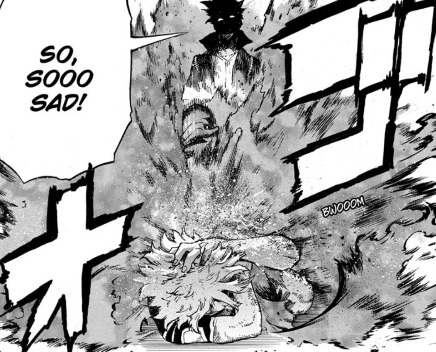
Dabi is shown wrapped in shadow as he confronts Hawks this chapter. That is because as his foil, as both of them were abused by the hero system as basically raised as child soldiers under the name of “hero training” they are two sides of the same coin. No one is closer to Hawks than Dabi, because Dabi is his own shadow. Dabi however is not just serving as a shadow for Hawks in a Jungian sense, but as a collective shadow for hero society as a whole. Read More underneath the cut explaining Dabi’s words for how there can be no true heroes in a society that doesn’t save people like Twice or Touya Todoroki.
1. A Society of Repression
Before getting the ball rolling I’m going to introduce some terms important to Jungian Psychology.
Jung saw the conscious mind divided in two. This is often referred to as the “iceberg model” because for the same reason that the titanic failed to dodge the ice berg, most people don’t have a true comprehension of personality because there’s much more going on than just what can be perceived in the surface.
The surface of personality is called the ego or the conscious mind. This is all of the thoughts you are aware of, all of the decisions you make, like your behavior, how you act, what you say, what you think, all of these things are conscious aspects of personality. They’re referred to as consicous because we can see, look at, control them to some extent. For example people tend to behave differently depending on their environment, you don’t usually swear in front of your grandparents but you might around your friends. The fact that you are choosing how you present yourself means part of personality will always be a performance.
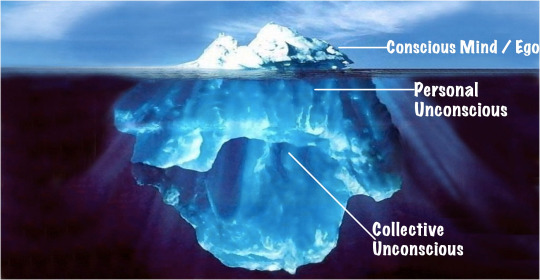
The unconscious mind is specifically what you are not aware of. It’s everything else that makes up personality. Jung believed the unconscious mind existed in a form called the shadow. The shadow is cast by what the light of consciousness projects, and consists of everything that consciousness excludes. It is the unknown side. If the consciousness is the face, the shadow is the reverse face.
It’s the difference of who you choose to be and who you are at heart.
“We can speak of the conscious ego as the subjective personality, and of the shadow self as the objective personality.”
Because one tends to reject or remain ignorant of the least desirable aspects of one's personality, the shadow is largely negative. There are, however, positive aspects that may also remain hidden in one's shadow (especially in people with low self-esteem, anxieties, and false beliefs).
The mechanism that people use to remain unaware of these aspects of their personality is called repression.
Repression. Repression. The unconscious suppression of psychic contents that are incompatible with the attitude of consciousness. Repression is a process that begins in early childhood under the moral influence of the environment and continues through life. [“The Personal and the Collective Unconscious,” CW 7,]
In general, people have a tendency to avoid rather than confront issues, especially if those issues are personal ones. Repression is a technique of avoidance to try to keep the mind healthy in spite of internal or external stress. Psychologically speaking it’s avoiding the problem. While of course it’s impossible to live life confronting every single problem possible, there’s still a difference between acknowledging a problem and admitting that it’s a problem and dealing with it by simply pretending that it is not there. Repression renders problems invisble by turning a blind eye to them, which is why this meta will be speaking of societal repression on a whole later one.
Jung suggests the idea that repression, having a shadow, being two-faced is not something that certain individuals do but rather something everybody is doing at the same time. In a society of people who all have this unconscious aspect of their mind Jung suggests the collective unconscious exists.
That the shared human experience of everybody existing within a society will create a collective suboncious amongst these people. The collective unconscious is unconscious ideas of society or life that just seem to be there. The myth of the hero itself is a product of collective unconscious, Jung posits every culture comes up with myths of heroes because that idea exists in some deep layer of our minds and it’s something we all have in common beyond the bounds of personal consciousness.
So just to summarize quickly you have three layers, personal conscious who you choose to be, the shadow who you are, and the collective unconscious what society is.
In Jung’s terms absolutely everything has a shadow.
"The image of God has a shadow. The supreme meaning is real and casts a shadow. For what can be actual and corporeal and have no shadow?"
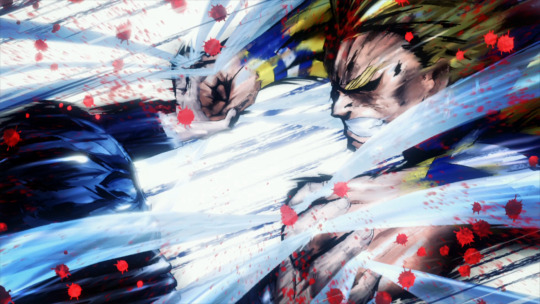
All Might and All For One are literally a symbolic hero and shadow pairing. All Might is someone who attempts to influence society by being the best hero he can be, All For One tries to control society too through violent methods. All Might is conscious of how he wants to create a peaceful, controlled society but unconscious of the violence inherent in his actions.
The shadow is something that everyone collectively ignores as well. Someone even points out that All Might’s actions are still violence whether it’s heroic or not and All Might doesn’t even address the argument he just blows it off. In a repressed society the issues that everyone wants to avoid aren’t dealt with they’re insvisible.
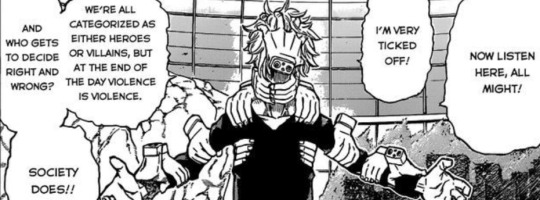
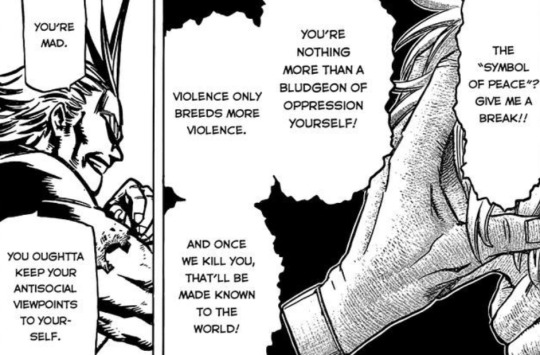
So not only is there an individual repression, but there are also aspects of societal repression. If everything casts a shadow then society itself can cast a shadow. The issues that everyone is avoiding, the issues that everyone is ignorant to will manifest in some way.
"Unfortunately there can be no doubt that man is, on the whole, less good than he imagines himself or wants to be. Everyone carries a shadow, and the less it is embodied in the individual's conscious life, the blacker and denser it is. If an inferiority is conscious, one always has a chance to correct it. Furthermore, it is constantly in contact with other interests, so that it is continually subjected to modifications. But if it is repressed and isolated from consciousness, it never gets corrected."
This is an idea that has been expressed in comics several times before. One of the most famous ones is Rorsharch’s monologue from Watchmen.
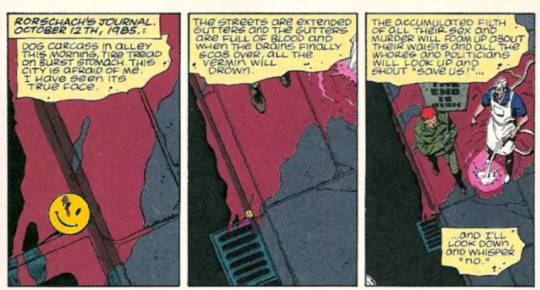
Rorsarch’s monologue is expressing a strictly Jungian idea. If no one attempts to deal with the problems that are inherent in modern day society and effect everybody, then those problematic elements will eventually float to the surface no matter how much they’re ignored. If one person litters it’s not a big deal, but if one hundred people litter then there’s going to be trash everywhere. If people keep ignoring the trash everywhere and make no attempt to deal with it, the problem is just going to stick around until it’s impossible to ignore.
This is what we are witnessing happening in My Hero Academia as of this arc. The accumulated filth of all their sex and murder will form up about their waists and all the whores and politicians will look up and shout, save us!
The League of Villains are not just characters. They are the manifestations of what has been repressed about society. They are the filth that has accumulated floating to the surface. This is an inevitability with repression. Everything that is repressed will show eventually.
2. There Are No Real Heroes
Dabi’s statement “There are No Real Heroes” isn’t just him being an edgelord. It’s a genuine response to the trauma he’s suffered. There’s on example from another piece of media I think illustrates this perfectly.
Dangan Ronpa: Another Episode is a story where children who were abused begin a rebellion first by killing the adults who abused them, and then against the society that ignored their abuse, but they begin taking it too far and slaughter adults who were not involved.
There is one moment in the game where the main character, a normal girl who has never been abused by an adult confronts one of the children about this. The best argument she can come up with is “Not all adults...”
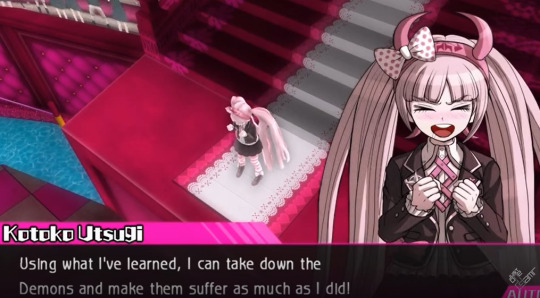
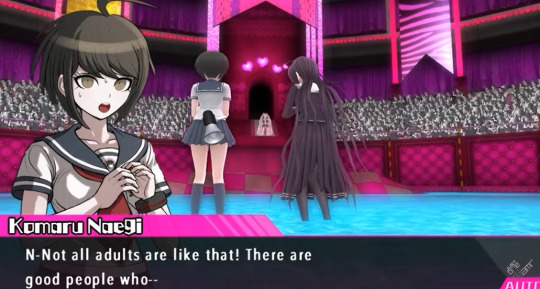
The child’s response is to scream: “Then why didn’t anyone save me?”
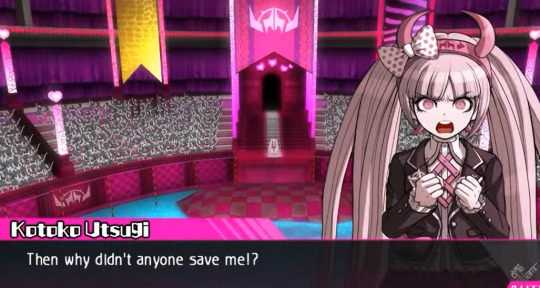

If the world is good. If people are just. If heroes exist. Then why did this little girl not get saved? Why was she abused by the people around her? Why did no one else come to help?
Remember Jung, people are on a whole not as good as we imagine them to be. The heroes in My Hero Academia are the same. We are told that they save people. We are told that they are good and right. Yet we witness countless examples of heroes not saving people. We see heroes being used as tools of violent suppression, rather than saving people.
There are no real heroes. In Stain’s words, heroes are phonies. That’s because heroes are not as good as we are told they are. Society is not as good as we are told.
What’s important is that a child is screaming this. What good is a society that can’t save one little girl? How do you expect a child to understand the reasons why they weren’t saved? For Dabi, for Stain, heroes are people who we are told are good but don’t act good. This is especially prevalent for Dabi who was hurt personally and had his entire family destroyed by one of the bad heroes. How is Dabi supposed to believe that heroes are good, when not only does Endeavor who doesn’t care about saving other people only defeating strong enemies is constantly praised as a good hero, but also completely got away with what he did to his family.
There is Endeavor the hero.

There is Endeavor’s shadow.

How can one of his victims. Someone who was most likely killed by him really believe that heroes exist when he was killed by a hero? How can he believe society is good when his father is praised by society. This is what repression does it makes people ignorant, and therefore complicit. Endeavor is not just the problem he’s propped up by society as a whole. Even people who are good, well-intentioned people end up supporting Endeavor completely ignorant to what he’s done.
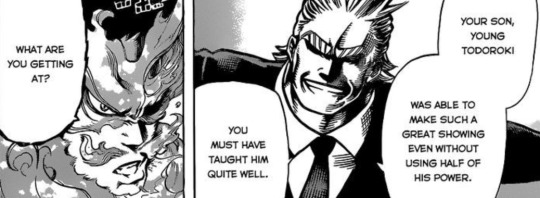
All might literally not only openly supports a child abuser like Endeavor, but praises him as a good hero, and even reccomends other children like Bakugo and Deku study under him. How much of this is genuine igonrance, and how much is intenitonal negligence? Todoroki walks around with a scar on his face and a clear chip on his shoulder about his dad. All Might doesn’t notice because he’s never questioned hero society before.

This is something we are shown over and over about hero society. That it thrives by intentional negligence. Shigaraki’s not being edgy once again he’s talking from experience.
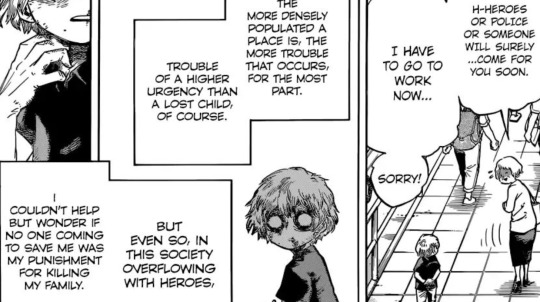
Shigaraki suffers a terrible accident and despite wandering around looking for help at five years old in one of the most densely populated places with several heroes running around not a single person comes to help him. It’s not just ignorance it’s intentional negligence, because Shigaraki’s not a good or virtuous victim, because Heroes don’t save people they beat up villains. They’re a tool for violent suppression.
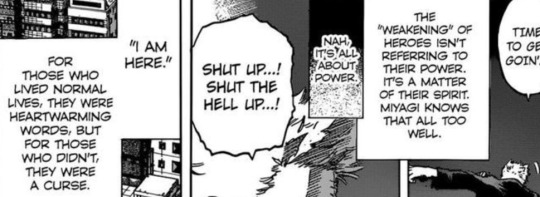
All Might acting as the symbol of peace also acted as a symbol of repression. Because there are groups of people who don’t get saved by All Might. People like Twice who will never get saved. How can they call themselves heroes if the weakest, the worst off, the most damaged are always thrown to the wolves.
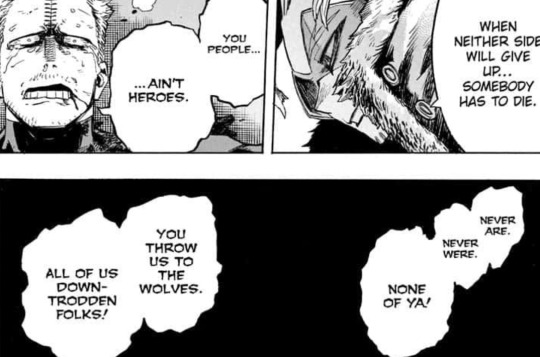
3. A Reckoning
What is repressed cannot stay repressed forever. Dabi is covered in shadow this entire chapter, because he’s acting as a stand-in for the repressed id of society. The shadow that is there and is created by the heroes. He even parallels the way Hawks was a few chapters ago.
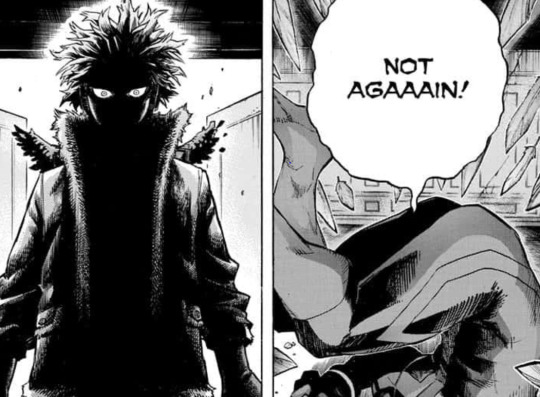
Another unheroic hero. A hero who doesn’t save someone crying and begging for help in front of them and instead decides to stab them in the back because that’s is what is easiest and most convenient.
Hawks. Endeavor. Heroes in general, claim to be heroic, claim to never give up. But then don’t bother to save people like twice, even when they’re crying and begging in front of them. We are being presented with heroes as they exist in the ideal, and then the way heroes actually act. Miruko says a hero never gives up, Hawks gave up on Twice and tried to murder him ridiclously fast.
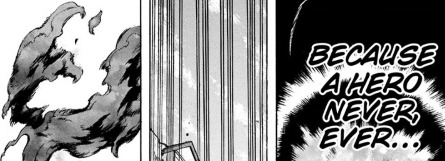


The light casts a shadow, this is a paradox we’ve seen before with Endeavor too. Hawks sees Endeavor as an ideal of someone who never gives up.
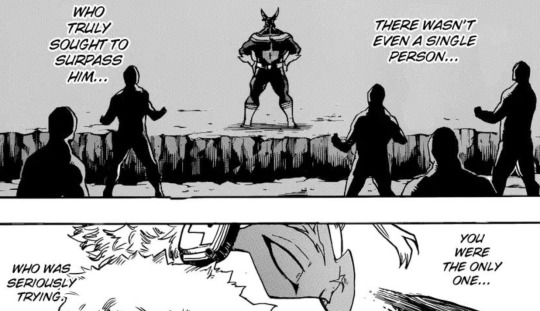
Natsuo rightfully pointed out that Endeavor gave up all too quickly actually. He gave up fighting against All Might and instead abused his wife and children.
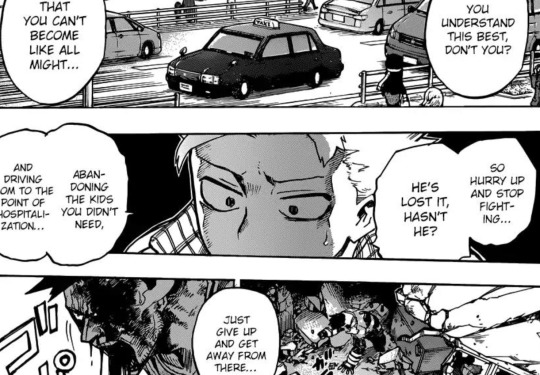
For every single action there is the light and there is the shadow. However, hero society never acknowledges the shadow and chooses to repress its evils instead of confronting them. It’s not that Endeavor abused his family it’s that he got away with it, not a single person held him accountable. Hawks was taken in by the hero commission in the exact same way that Shigaraki was by AFO, and nobody held them accountable for doing that to a child.
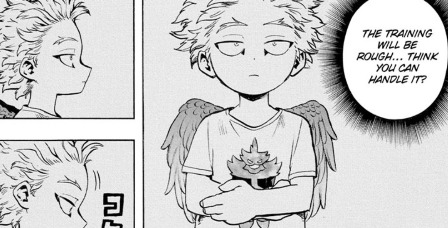
Child abuse is still child abuse even if the “good guys” are doing it. In Jungian ideas if nothing is confronted about society then eventually something will rise up.
"[The figure of the Trickster] is the collective shadow."
A collective shadow. A collective societal Id. Returning to Rorsharch’s quote it’s quite literally the trash that everyone threw away floating back up to the surface and brought to light. This is why people are moved by Stain’s words, because it is in a way a wake up call to confront what is wrong about society.

Stain, Shigaraki, Dabi all three of them are manifesting of literal collective shadows of society. They are there to confront what everyone is told is good and show the darker sides to things.
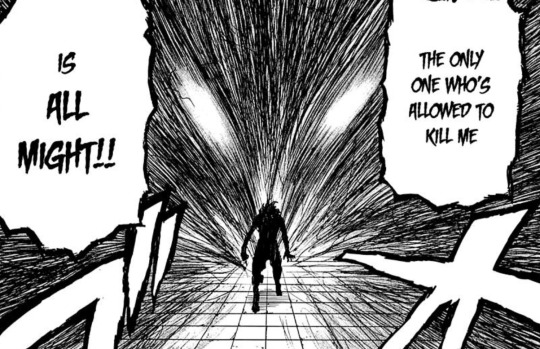
That is essentially what Dabi is talking about. Dabi himself is not just an abused child, he stands in for all of the abused children who get left behind or ignored by society.
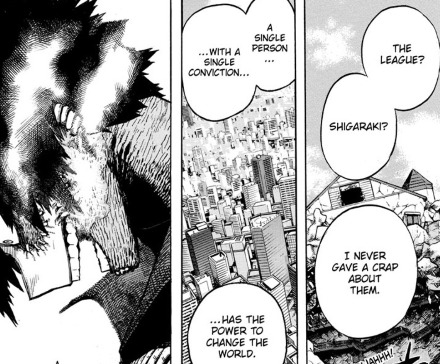
What Dabi is talking about is a reckoning. The confrontation with the shadow of society that will inevitably happen. The garbage floating to the surface. Dabi is embodying that shadow in his actions. Individuals don’t matter. What matters is the collective will of everybody, all of the outcasts banded together, everything which can be no longer ignored.
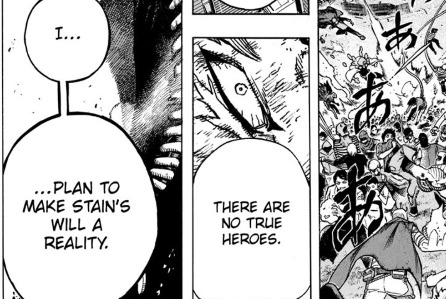
Which is why in a Jungian sense, the league themselves do not matter. Dabi himself does not matter. Not even Hawks matters. What matters is the ideas they represent behind them. It’s why Dabi cannot be killed, because eventually hero society continuing on unchanged will just create another Dabi.
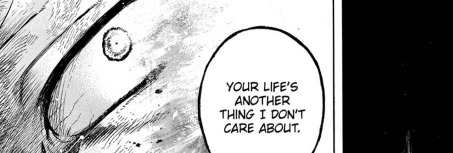
Individuals and individual suffering do not matter in the face of hero society. That’s what Dabi is angrily reminding Hawks of. He may have just saved a bunch of people by killing Twice, but nobody is going to thank him, his deeds are going to go unrewarded, because in the end Hawks too is somebody as equally disposable as Dabi and Twice. What matters is the ideas they represent, and Hawks has murdered someone in the name of resisting change to the status quo while Dabi is trying to fight it. Hawks too is complicit in the same system that abused him as a child, and his actions do nothing to stop that abuse.
A reckoning. A fall. A shadow that is not confronted or acknowledged will never change. If it is repressed it will never get corrected. My Hero Academia posits that not only is hero society falling inevitable, it is also necessary. Dabi himself is a villain, but he’s also acting as the shadow of all of the ills of society in order to force society to confront those ills rather than just continue on ignoring them.
#mha meta#hawks#dabi#league of villains#hero society#takami keigo#todoroki touya#my hero academia meta#my hero academia
886 notes
·
View notes
Text
What if Keiji wasn't the Keiji we know before the first trial?
Okay, hear me out. What if Keiji wasn't as logical and cold hearted as he is in the game until his first trial? What if Megumi's death was what pushed him over the edge and onto that path?
—
I'm going to be talking about Shin a lot in this hypothetical, because they're the foil characters of the century lol.
If we compare Keiji's first trial to Shin's in the sense of this assumption (that the first trial made him the Keiji we ally with in the game) this might all make a little more sense.
First off, their trials could both be designed to shape them into a certain type of person. Shin's was to mold him into an antagonist reminiscent of Sou Hiyori (maybe to fill his absence?) while Keiji's could then be to make him a firmly logical figure in the death game.
If Keiji was less logical before the death game, still traumatized, but teetering between full-fledged, coldhearted logic and taking another shot at a more hopeful, emotional way of being, that would mirror Shin's previous state of being stuck between choosing trust and distrust of others in the vulnerable emotional state of recovering from recent abuse.
They would then both have been in vulnerable states due to trauma, and have had the first trial make that choice of what paths they should take for them. Shin's trauma stems from being weak, so for him, that would mean embracing his lack of trust in others to protect himself. For Keiji, his trauma stems from failing to live up to his moral ideals of what a policeman should be and instead killing someone innocent, so this trial would reinforce the belief that he really is just a cold-blooded murderer, prompting him to embrace this role during the death game.
Just as Shin's choice was between continuing to be Shin Tsukimi and living, Keiji's was a cruel and forced confrontation of his trauma as well. Letting Megumi live would be forgiving her for her corruption and the part she played in traumatizing him, while letting her die could finally be the thing that lets Keiji move on from his past. He didn't have the time to think about the choice between forgiveness or resentment, and his inaction made the choice for him. Instead of catharsis, though, it only solidifies his guilty thoughts about himself and makes him infinitely colder.
Keiji and Shin already parallel each other in a lot of ways– even now, their first trials alone draw some comparisons. How Shin actively (and metaphorically) killed 'Shin Tsukimi' while Keiji literally (and inactively) killed someone, how Shin dramatically and emotionally (that emotion being Paranoia) wields his distrust while Keiji protects himself by more subtle and logical means. And if the white room does turn out to be the room in which Keiji and Megumi's first trial took place in, then Shin and Keiji have a yin and yang colour contrast going on as well.
To break this down even further:
Before trauma → After trauma, before the death game → During the death game, specifically after the first trial
Trusting in others, maybe even naïve → Unsure of whether to trust others, doubtful of their intentions as a result of abuse → Does not trust others for shit, especially not those he perceives as stronger than him
Idealistic about the police, wants to follow in Mr. Policeman's footsteps and protect people → This new cynicism towards the police and people in positions of power and his failure to be different than them by shooting an innocent man makes him uncertain of himself → He lets himself shift from protector to willing to sacrifice others for his own safety completely
SO BASICALLY WHAT I'M SAYING IS, the middle step may have been different for Keiji than what I previously thought. Maybe he wouldn't be willing to do all the horrible, selfish things he did in the death game if it wasn't for Asunaro making that his first trial. (And sorry about that, I just wanted to make a flowchart lol.)
So perhaps the final parallel this assumption would present between Keiji and Shin is that while Shin's trial pushes him to drown his distrust of others, Keiji's pushes him to drown in his distrust of himself.
I really think that people forget sometimes that Keiji didn't necessarily want to murder Megumi. Not to pretend that what he did was okay, but had his trial been “press this button to kill your partner,” he may have not done it. He's obviously very unsure about his decision afterwards. He laughs and falls to his knees after she dies, which does not seem like the most calculating, malicious, and sane response to me. If it was just the laughing, maybe. But there's also this:
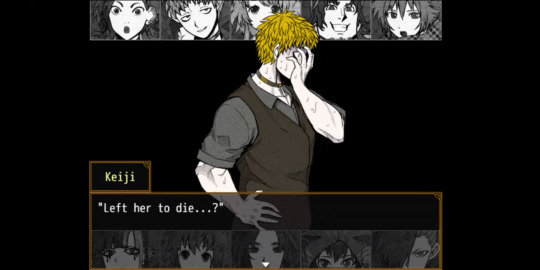
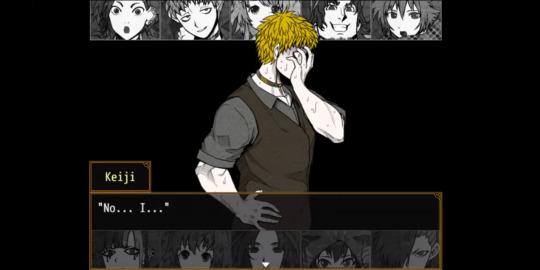
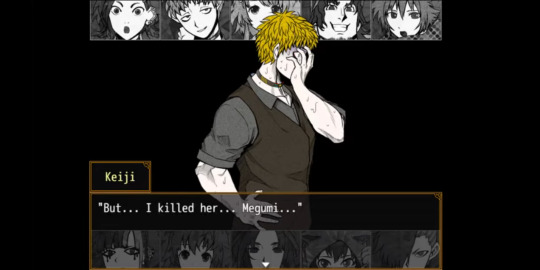
I find these screenshots very interesting, not only because they prove that Keiji didn't murder Megumi in cold-blood and is distraught over her death, but also because they draw another parallel between Shin and Keiji; Shin is very certain that others are not to be trusted. Delusionally certain to the point where he views a highschooler as the second most dangerous person on the planet and thinks it's okay to make her life harder because she's definitely trying to kill him and every other vulnerable person! While Keiji… Keiji is so painfully unsure of himself. He's unsure of himself to the point that this is his reaction to Megumi's death, despite him choosing to do that. He rationalizes everything in a desperate attempt to bury his emotions and make what he's doing okay. Shin trusts his thought process way too much and Keiji literally states that he has not been able to trust himself since the shooting.
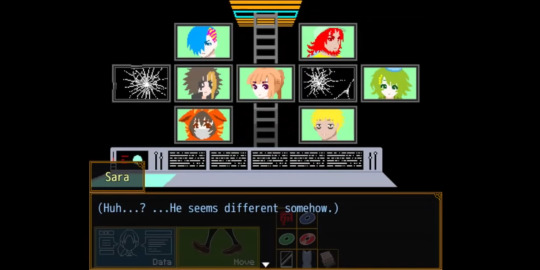
Another small detail to maybe back this up is the above screenshot. This isn't much, but Sara said Keiji seemed “different somehow.” Perhaps a little less creepy? A little less untrustworthy? A little less willing to flirt, lie, or kill to save his own skin? There's not much insight to be brought by Keiji's AI since Sara didn't have time to talk to him here and it's impossible to talk to him through his me-tokens, but I feel this is significant. We don't know when the AI's are from, specifically– it could be just before the death game, or a couple of years before. Presumably, Keiji back then looked the same as Keiji now, but he may have been less ruthless than our Keiji, since generally, the AI's do seem to be somewhat behind.
There are still a few questions around this theory (if you can call it that), though– namely, why? Why would Asunaro want to make Keiji more logical? Didn't he fit the role of Sara's ally well enough without the extra trauma? To set up Keiji's trial in such a manner where it'd be easy for him to let Megumi die but intentional enough to feel like he caused her death… it seems like a very purposeful move on their behalf, but I don't know why they'd need to do that.
And also, would they even need the effects of her death on Keiji? Because it's not like her survival rate is 0%– there were trials in which she lived. If they needed to do that to him, wouldn't they ensure it happened? Unless, they didn't need it and it was just a side effect? I know I just said it seems very intentional, but it's still possible that it may not be lmao. But, of course, the trials could differ from the death game we know... perhaps her and Keiji's first trial could've been different in different simulations. But that still kinda pokes a bit of a hole in this assumption, lol.
I'm worried that this might be really obvious and I'm just over here acting like I've had an epiphany for no good reason LOL, but I don't often see people talking about Keiji's first trial in the same way as Shin's, in the sense that they were what made them snap– the final straw that set up their actions for the rest of the death game. So I wanted to introduce that concept specifically if people weren't already of that opinion 👉🏼👈🏼
I personally kind of like this… pseudo-theory, I'll call it. It feels like it'd exacerbate the guilt Keiji feels throughout the game, if he was more newly logical and less numb to these actions than originally considered. It's hard to say if it could be accurate, though, because we don't get much to see what Keiji's thinking much! It kind of drives me insane, please let me know what the hell is going on in Keiji's brain Nankidai ;;
That's all I got lol, thanks for reading ✌️
#your turn to die#keiji shinogi#yttd keiji#shin tsukimi#kimi ga shine#i did talk about shin quite a bit so i guess i'll tag him too#idk i think this would just be interesting 👉🏼👈🏼
61 notes
·
View notes
Text
Blood on the Beach (Adam+ Dave)

Characters: David Herring (Selkie- Immo), Adam Walker (Hunter - Tapir)
Summary: Adam encounters a hongrey seal. Dave is fighting for keeps but Adam disobeys protocol.
Content Warning: Head Trauma, Vomit
The spellcaster’s blood was still thick and heavy in his mouth, but no matter how rich a delicacy it was, there was an even better prize on the table. Where before Dave had barely had the tiniest threads of self control, strained to the edge after so many days of resisting a hunger he still refused to seek help for, with the smell of selkie in the air, all bets were off. His focus was pinpoint thin, as he cut through the water, following the scent without realising it was so close to the docks he’d been trying to avoid for the past several days. Reaching shore, Dave strode out in soaking wet clothes that were stained in varying ages in blood.
A man in his early thirties was chilling on the shore, in shorts despite the chilly wind whipping around them as he read a well worn. Ollie George was skinny and sinewy, inclined to spending his time on the beach regardless of which skin he was wearing. As Dave approached, he sat up, squinted at Dave through the bright sunlight and smiled toothily as he waved. “Hey Dave! You look rough, have you- woah!” He yelped as Dave grabbed him to the throat, and dragged him backward. Scratching at Dave’s bloody arms, Ollie managed to get onto his feet, only to have the air knocked out of him as Dave slammed him against the seawall. Dave panted heavily, his teeth bared. But a tiny voice kept him from lunging just yet.
“Yo Dave I talked to Sebastian and…”
Adam strode down the ramp at the far edge of a nearby pier, jogging into the low tide zone toward where he’d caught sight of his noodling partner. The crunch of Adam’s shoes on the sand and shells paused as the Hunter took in Dave pressing another guy up against the cement sea wall. From the way the lean dude was struggling and Dave’s teeth were barred, Adam doubted he’d walked in on a mlm remake of the Shape of Water.
Hesitation costs lives. Adam sprinted across the remaining stretch of beach to barrel into Dave with a footballer’s full-bodied tackle.
Dave was aware of Adam in the way a horse might be aware of a gnat, some hind brain motor processing that he could smell the hunter nearby and opting not to care. A vein bulged in his forehead, pressing his forearm against Ollie’s throat as he opened his maw ever wider. Inch by treacherous inch. A lifetime of protecting selkies was slowly overridden with a hunger Dave did not know how to explain.
The hair was knocked out of him as Adam sent them both careening into the sand and rocky dirt. Ollie slumped against the seawall, clutching at his chest as he gasped for air. Dave swung his head round to look at him as Ollie began staggering towards the water and his escape. Normally, Dave would have kept his eye on Adam, the skilled youthful hunter who appeared the obvious threat. Dave barely even acknowledged him other than to slam a fistful of rocks and sand into his face. He rolled onto his knees and sprinted after Ollie, towards the waterfront.
Adam drew both legs anterior to his chest and kicked himself back to his feet and with an economy of motion born from a lifetime of drills. The Hunter had already drawn two tactical knives from their sheathes before he was even fully standing.
The next step was simple, practiced countless times, and Adam was already using the momentum from the kick-up to bring his arm forward and pitch a knife straight into Dave’s back. The impalement would stagger the Selkie for a moment, and that’d be all the Hunter would need to end this.
Yet, the knife never left Adam’s hand. A flicker of indecision turned lethal grace into a baseball newbie’s first stumping on the pitcher’s mound, blinking sand from his eyes.
Could he really do this all over again? …What about this other guy running from Dave? Was it right to jeopardize his life for the sake of sentiment? ...Dave would never do this in his right mind...But Adam had already needed to put down plenty of people who couldn’t control themselves to save other lives...He no more right to spare Dave’s life then he had the right to take it.
Adam’s head was filled with contradictions, but silver and iron blades dropped to the sand as he sprinted headlong after Dave.
Sprinting under the pier, Ollie vaulted abandoned netting rigs, ripped up tarps, and something that might later be identified as a mummified hand, yelling as he tried to gain distance from Dave through the obstacles, but Dave ran with the same precision that he swam with, a predator nearly in his element even with saliva slobbering down his mouth. Making a last ditch effort, Ollie veered right toward the see, but the tide barely lapped at the soles of his feet before Dave tackled him, slamming both bodies into the floor. Veins bulging, Dave pinned Ollie’s arms under him, grappling with himself too, and the hunger that felt as wrong as it felt demanding.
Ollie bared his own seal teeth, eyes filled with terror as he tried to snap at Dave’s face, but he was pinned down by Dave’s forearm. He begged, voice creeping up in pitch with every frantic word.
“Dave, Dave, stop stop stop! Is this about the lobsters? Because I swear I didn’t know they were Karkinoids, I would never- please, Dave c’mon it was only one finger it was a- hey help! HELP!”
Dave’s head whipped to where Ollie was looking, and he growled deep in the back of his throat. “Stay back, hunter.”
“No, Dave man this isn’t you,” insisted Adam.
Looking at Dave now, teeth barred and feral in the eyes, Adam experienced an unwelcome memory of himself at the Hunter’s Moon. A twinge of self-loathing nausea came with recollections of the intoxicating power that’d bled into him from the red moonlight. Had he seemed just like this to poor Rio and Nell, hopped up to the crazy eyeballs on some paranormal bullshit till one barely resembled the original person?
A small pain in the Hunter wondered whether the true Adam underneath was really so different the then moon-drugged killer his friends had confronted on the glass lake, but Adam pushed such thoughts aside.
All that mattered was that whatever had gotten into Dave, literally, he shouldn’t have to wake with a stomach full of fellow selkie.
“Sorry dude, gonna have to eat me to get rid me. Noodler-bro unity.”
Adam sprinted towards where the two paranormals were grappling and shifted his center of gravity and thrust forward his right leg while keeping the left leg slightly behind it. The Hunter hit the last stretch of sand into a rough slide tackle that’d have earned an immediate red card on any soccer field. Adam’s low hooking kick slammed into Ollie as if he were the soccer ball, directly hitting him a combination with mutant strength and accelerated leverage, wrenching him from the other Selkie’s grasp by blunt impact. The rest of Adam’s momentum carried him bodily into Dave in a unguarded full-on collision, a price to pay for getting the hostage outta there.
Dave lunged for Ollie as he was knocked out of Dave’s grip, but Ollie grunted, rolling out of Dave’s reach, clutching his side. He didn’t even get to his feet, scrabbling into the water without a second glance at his assailant or his rescuer. He slipped into the waves as easily as if it was his second skin, gone, while Adam slammed into Dave. With a growl of bared teeth, Dave salivated over the fresh meat trapped underneath him, even though he was furious at the loss of the tastier prize. “No.”
When it came to killing hunters, the easiest thing was to ambush them, pull them out of their element and into the water. Even the weakest of them was stronger than he was on any day of the week, with the training and energy to go along with it. Take out the limbs, get the throat, don’t let them find their balance. Kill before they could land a single blow, because if a hunter wanted you dead, that was all the hope chance you had. Dave couldn’t separate his training from Adam any more than he could separate the hunger from his rationality. He took as little note of his own desire not to kill and eat Adam as he did Adam’s desire not to kill him.
With a quick shift of his weight, he trapped on of Adam’s arms under his body weight, and opened his mouth wide, but it wasn’t Adam’s throat or head that he aimed for, but the meat of Adam’s shoulder on his other side.
For a moment Adam’s whole world was just flares of veined red in a black tunnel as pain lanced though his shoulder into the bone. His body begged to pass out. Adam’s back arched as he spasmed with in agony. Dave’s teeth closed like an aspiration straight into the marrow. Warm blood broke like a wave down over Adam’s back to stain the sunbright sand. Shock threatened at the threshold of his guts like an approaching wave of cold.
The Hunter willed himself to stop spasming as training ran his mind through the next steps of getting out of this hold. If Dave wrestled him to the water and got his neck exposed, Adam’d be arguing about today’s Black Bears game with Dad in under a minute.
But although his reflexes were primed to end this now, Adam fought back against that lifetime of muscle memory as a higher purpose than just survival gave his mind clarity through pain.
Adam let out a ragged rap of pain as he twisted in Dave’s grasp, tearing his own flesh further with the movement. He swung up his free arm toward the side of Dave’s head. While survival instincts screamed to cave Dave’s head in, enough of Adam’s reason remained to hold back.
Instead Adam used the flat of his palm to try to daze the Selkie enough to break his hold, even though ever bit of training dictated that a puncturing blow to the jugular with mutated strength would be the “correct” move.
There was a moment when Dave’s teeth met the resistance of bone, that only lasted the length of two heartbeats, where he could have bitten right through the socket and leave Adam without an arm he could ever use again. Or he could twist his head and tear away the flesh already between his teeth, so that Adam’s blood would spurt over the sand rather than in his mouth while Dave could finally, finally eat.
He did neither, frozen in an internal battle as ferocious as the external, slowly increasing the pressure on the bones between his teeth as muscle and sinew popped to get the bone out of his way. Coppery blood coated his tongue, lips and chin, tantalisingly close to what he wanted and so far from what he wanted it might have been on another planet.
Stars exploded from Dave’s temple, the force of Adam’s blow knocking his jaw loose and body off balance, giving Adam all the time to get out from under him, leaving a bloody mess in the sand and granite. It wasn’t the first time Adam had bled on a beach in front of Dave, leaving a mess in his wake as he’d bargained with a monster for his and Dave’s life. Dave blinked away the stars and sentimentality as he bounced to his feet.
Like the bloody mess of his arms and the deep gash in his face, Dave shook his head to shake off the growing headache, bared his bloodied teeth, and slammed Adam into one of the pier’s wooden pillars.
Everything flared white. The high pitched ringing in Adam’s ears made the foamy surf sound like it was screaming onto the beach.
Adam had never been trained to merely subdue or fend someone in a fight. Adam wasn’t a police officer, bouncer, or street tough who roughed up squishy humans to assert authority. Adam had been conditioned as a soldier to fight ravenous immortals, giant beasts, and eldritch things from beyond this universe. These adversaries were so preternaturally lethal anything less then the most brutally efficient kill meant you were dead a second later. Even a lowly Spawn could tear a human in half. The common forest Carach could wade straight through small arms fire and pop open your ribcage like a candy orange. The mission had always been simple: kill this thing before it kills you and everyone else.
Except today apparently, where Adam’s mission was to put a cease and desist on roid-rage Captain Ahab here.
Shit shit shit
Pain splintered into Adam’s back as the pier barnacles sliced his back open. Dark red stained the white clusters clinging to the pier as their razor edges tore into Adam’s flesh. The Hunter felt the bitter salt sting of the barnacle cysts grinding deep into the wound as Dave slammed him against the sodden wood pillar, probably looking for an opening to sink those teeth into Adam’s throat.
The muscle memory of training immediately pulled Adam towards the lethal solution. A glance at Dave told the mutant where he could aim blows that’d punch through ribs with enough momentum to rupture organs.
Adam let out a shuddering breath, gagging on the bloody bile and trying to fight past the concussed fog in his brain. With another rasping exhale, Adam pushed away the deadly conditioning that’d served him so well for so long. That wasn’t why he was here.
Adam reached his arms up and behind his head to grab the opposite side of the pier pillar. The tired muscles of the Hunter’s biceps knotted as Adam hoisted himself into a dead hang up through leverage and brought his knees up to slam a quick two-legged kick into Dave’s gut. Adam pulled his weight off from the kick a bit just before impact, not wanting to break anything internal.
----
Crashing backwards into the sand, Dave grimaced as his distended, overful stomach pushed acid up his throat. Days and days of overeating while still famished were taking a toll, but he couldn’t afford to let the pain breath. Dave pushed himself back onto his feet, eyes fixed on the bloodied mess of Adam’s shoulder.
He should have torn that arm right out of its socket. The thought turned his stomach too. There were a couple dozen humans in the surrounding hundred feet. All Dave would have to do would be climb on the docks. No one up there would fight back, not enough to be a problem. A stranger wouldn’t create such a strong internal struggle. Dave glanced up at the pier, then back down at Adam, hands curled into fists so tight the skin of his knuckles might split.
“Get out of here.” Dave warned through grit teeth. Or begged.
Adam’s eyes followed Dave’s gaze up past the rock seawall towards where passerby in the harbor were blissfully going about their business. Understanding passed from killer to killer.
Adam shook his head. “Don’t do it.”
The effort of the deadlift moments before has taken its toll. One arm hung limp at Adam’s side as the exacerbated injury in his shoulder sent ripples of cold numbness that made it hard to even his finger. Adam’s clothes were a mess, torn by lacerations, barnacles, and sodden with spreading scarlet from one shoulder, all across his shredded back and the blunt-impact head wound now bleeding down his neck.
But Adam lifted his remaining functional arm in a boxing guard. He squared up to face Dave, feet angled parallel with the right slightly ahead of the left, chin up, eyes forward.
Dave blurred in out of focus in Adam’s vision, seeming to merely be a distortion of light from the crystalline blue surf and pale sand. The athlete knew more than enough about bloodloss and concussions to realize the danger he was in, but running was a non-option.
“I’m not gunna kill you man,” Adam assured, moving slowly to the side and around as he looked for an opening in Dave’s guard. “Come back with me, we’ll find an antidote. I’ll keep you from hurting anybody while we figure out to get this out of you.”
Adam’s words only barely made it through Dave’s skull as he stared at Adam, mouth open and closing like it was longing for something to chew. An antidote? Dave didn’t need one of those. The only fix to starvation was consumption. But he’d known something had been wrong for a while, since that day on the beach with Griffin, since before.
Dave forced himself to look at Adam as more than meal and enemy. His eyes didn’t quite focus on Dave’s, his guard was one handed, and his expression resolute. His stance was as sturdy as could be, but on shifting sands that were quickly getting wet with his blood, Dave didn’t see much strength in him.
Maybe the hunter would be an easy meal after all. If Adam took half a step forward, he’d step on a seaweed coated net, that if Dave pulled on just right could knock the boy off his feet, maybe even hauled into the water. It was tempting. One more bite and even a hunter’s healing likely wouldn’t be enough to pull Adam back from the brink. Or, the steps up onto the pier weren’t that far either, a dozen satiating meals chatting idly about the May sun, just waiting for his bite.
“No.” Dave trembled, taking a slow, uncertain step back.
The hunger inside him wasn’t just poisonous, but monstrous too. The kind people like Adam were needed for. Dave swallowed, Adam’s blood still mixed in with the saliva dripping out of the corner of his mouth. This sliver of control, paid for in Adam’s injuries, wasn’t going to last. The hunger was clawing its way up his throat, down his gullet, like it might consume him from the inside out.
“No.”
Like if he didn’t eat someone else, his hunger might eat him. Dave took another step back, grimacing at the ache of a bruise forming under his ribs. A wave rushed water up to his ankles. The only advantage of Adam bleeding so profusely is that Dave could no longer smell the enticing scent of selkie. He opened his mouth to speak again, but couldn’t find any words.
Dave plunged into the waves, speeding away from shore, putting as much distance between him and Adam as he could before his hunger eclipsed his conscience once more.
Adam tried to sprint at the departing Selkie but his steps became sluggish in the sand. Dave was a black spot vanishing into foam as refractions from the surf were burning lances across his vision. Everything spun, the sky and sea switched places in a rush of blue. Light went out.
9 notes
·
View notes
Text
Wizards Hearts Recs: In Vino Veritas
Wizards Hearts was a four-month-long Drarry reading fest. Players were given a playing deck of 52 tropes, and were asked to find 52 different fics to read and comment on to fill their decks. To prevent the same few fics from being read, fics were restricted to only being used for the game three times before being considered ineligible for further points. The tropes and submissions list can be found here.
Check out the masterlist of fics for this trope below the cut!
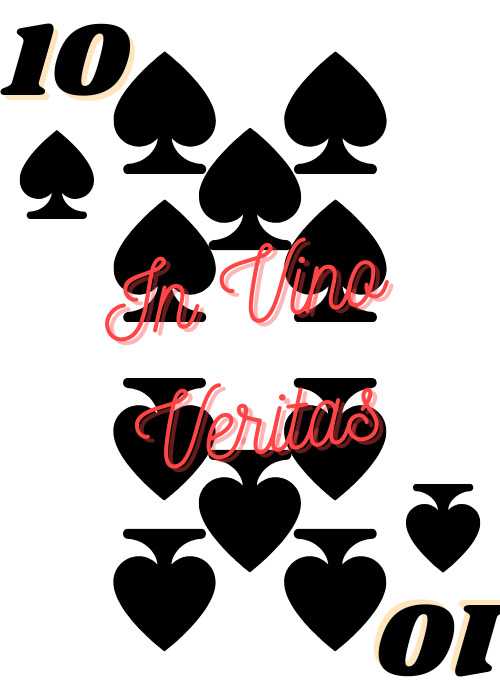
📜 Special Delivery (previously Amende Honorable) by alittlebitAlexie Rated: Mature Words: 11628 Tags: Post-Second War with Voldemort, Apologies, Misunderstandings, Accidents, Owl Post (Harry Potter), Bartender Draco Malfoy, Bartender Pansy Parkinson, Draco Malfoy & Pansy Parkinson Friendship, POV Draco Malfoy, Unrequited Crush, Diagon Alley, Death Eater Trials mentioned, Letters, Love Letters, Gay Draco Malfoy, Flatmates Draco and Pansy, panic attack (mentioned), Nightclub, Confrontations, Running Away, Outing, Veritaserum, Harry Potter Epilogue What Epilogue | EWE, Kissing, Snogging, Undressing, Not Actually Unrequited Love, Secret Crush, Not Beta Read, Not Canon Compliant Summary: After his trial, Draco writes apology letters to everyone he has hurt. Not so special. But he writes two to Harry. One to actually send, and one (that was never meant to see the light of day) to pour his heart out and admit things like thinking Harry has a fit arse and was his sexual awakening. What could go wrong? Well, Pansy could accidentally mail the wrong letter. That's what. ❤️ Read on AO3
📜 Vanilla and Sweet Spices by FleetofShippyShips Rated: Explicit Words: 20032 Tags: HP: EWE, Hogwarts Eighth Year, Drinking, Drunkenness, Rimming, Anal Fingering, Anal Sex, First Time, Awkward First Times, Morning After, Mildly Dubious Consent, Because of the drinking, Plot What Plot/Porn Without Plot, Porn with Feelings, Pressure to drink Summary: After the others leave an eighth year party, Harry still has the rum he snagged off Dean. But the only person left to drink it with is Draco Malfoy. ❤️ Read on AO3
📜 Veritaserum by Digitallace Rated: Explicit Words: 5822 Tags: N/A Summary: Draco brews a batch of veritaserum in order to get some answers out of Harry at last. ❤️ Read on FFN
📜 Stand Back: I'm About to Perform Archaeology by Blowfish_Diaries Rated: Explicit Words: 9784 Tags: Archaeology, Hogwarts Eighth Year, Fluff, Copious Dr Who references, literally zero angst, Mentions of Draco in lingerie, Anal Sex, Oral Sex, Drinking Games, Washing pottery, Seriously so much pottery washing, All of archaeology is actually just pottery washing, Draco in safari gear, glamping Summary: A new Muggle Studies professor takes the Eighth Year students to work on an archaeological excavation. In which Draco is lazy, Harry is sweaty, Hermione is drunk, and Ron turns red. ❤️ Read on AO3
📜 Sex, Lies, and Veritaserum by lettered Rated: Explicit Words: 17953 Tags: Dirty Talk, Fingerfucking, Anal Sex, Kink Negotiation Summary: This entire fic is one long conversation about sex. ❤️ Read on AO3
📜 In Vino Veritas by cassie-black12 Rated: Explicit Words: 16986 Tags: In Vino Veritas, HD_Holidays Summary: They say weddings are the perfect occasion for bringing together family and friends; but what about old enemies? ❤️ Read on LJ
📜 You Say It's Your Birthday by Emma Grant Rated: Explicit Words: ~4000 Tags: N/A Summary: Harry gets very drunk on his 30th birthday, so drunk that he has no idea what happened that night -- except that it somehow involved Draco Malfoy. ❤️ Read on LJ
📜 A Shorts Story About Love by onereader Rated: Explicit Words: 3439 Tags: Magic University - Freeform, Harry Potter Epilogue What Epilogue | EWE, Student Harry Potter, Student Draco Malfoy, Recreational Drug Use, Marijuana, Bisexual Draco Malfoy, Bisexual Harry Potter, Redeemed Draco Malfoy, Anal Sex, Making Out, Getting Together, recreational alcohol use, Pansy regrets everything, Hermione Granger & Harry Potter Friendship, Hermione is the friend we all want, Lowkey they're all fucking, Breaking house rules, A couch is properly defiled, Smoke rings as foreplay, The way to a man's heart is through his shorts Summary: House-sharing with Slytherins, student life, magic weed, and short shorts. Harry's life at university might be strange, but he wouldn't change it for the world. ❤️ Read on AO3
📜 Between Myth and Man by slytherco Rated: Explicit Words: 16242 Tags: Veritaserum, Truth Serum, Mundane, London, Falling In Love, Lies, Angst, Angst with a Happy Ending, This whole story is just Draco angsting really, Sexual Content, keeping secrets, Smoking, Bad Weather, References to Drugs, Making Out, One (1) Scared Little Sparrow, And also lots of texting Summary: Draco, lost and a little broken, navigates post-war reality convinced that people like him should not be allowed to make their own choices. To solve the problem of his self-sabotaging tendencies, he starts taking a few drops of Veritaserum every morning. A story about the complexity of choices, repressed desires that come to the surface when we least expect them, and the utter hopelessness of truths built on a foundation of lies. ❤️ Read on AO3
📜 Proving a Theory by Marie_Tomas Rated: Teen and Up Words: 29024 Tags: Post-Hogwarts, Post-Battle of Hogwarts, Humor, POV Harry Potter, Harry Potter Epilogue What Epilogue | EWE, Flirting, Awkward Flirting, Bad Flirting, Drunken Flirting, Drunken Confessions, Hogsmeade, Three Broomsticks, Professor Harry Potter, Oblivious Harry Potter, Character Study, Relationship Discussions, Light-Hearted, Sexuality, Confused Harry, Plot Twists, Scheming, Famous Harry, Harry Potter is So Done Summary: Eleven years after the Battle of Hogwarts, Harry is approached one evening at the Three Broomsticks by Draco Malfoy, who claims that thanks to the publication of Harry's official biography, everybody in the wizarding world has come up with a very interesting theory about the two of them... ❤️ Read on AO3
📜 Christmas Is For Sex (and Love), So Give It To Me by GoldenTruth813 Rated: Explicit Words: 53218 Tags: PWP, Established Relationship, Christmas, Bondage, misuse of frosting, making gingerbread houses, coming without touching, Blowjobs, Fingering, anal penetration, Rimming, misuse of fairy lights, Praise Kink, Nipple Clamps, erotic massages, Lingerie, Harry in Lingerie, Butt Plugs, Masterbation, Dirty Talk, Overstimulation, Topping from the Bottom, Ice Play, misuse of snowballs, misuse of brandy custard, veritasium, Public Sex, misuse of christmas candles, Wax Play, floating blow jobs, bubble baths, Candy Canes, misuse of candy canes, sex with feelings, Clubbing, naughty letters, babysitting teddy, Edging, healing past trauma, really so much more than sex, but lots of sex too, spiked hot cocoa, Drunk confessions, Anal penetration with a foreign object, french!draco, Switching Summary: Draco buys Harry an Advent House, intent on helping Harry create all new holiday memories, and have a lot of great sex in the process. ❤️ Read on AO3
📜 Mixed Drinks and Crossed Wires by korlaena Rated: Explicit Words: 16470 Tags: Auror Harry Potter, EWE, Miscommunication, Pining, Drinking, Drunken Shenanigans, Drunken Kissing, Face-Fucking, Anal Sex, Light Dom/sub, Friends to Lovers Summary: Draco is a handsy drunk. Harry is okay with it, really. They’re friends, so it doesn’t mean anything. ❤️ Read on AO3
📜 Never Feel the Burning Light by carpemermaid Rated: Explicit Words: 48578 Tags: Fake/Pretend Relationship, Fake Marriage, Living Together, Party Games, Sharing a Bed, Unresolved Sexual Tension, Denial, Pining, Mutual Pining, Jealousy, Hero Complex, Masturbation, Intergluteal Sex, Oral Sex, Post-Hogwarts, Post-War, Falling In Love, HP: EWE, Prostate Massage, Drunken Confessions, Drunken Shenanigans, Minor Hermione Granger/Ron Weasley, Minor Ginny Weasley/Luna Lovegood, Minor Pansy Parkinson/Theodore Nott, Romance, brief mentions of Draco Malfoy/OMC, Lack of Communication, Getting Together, Slow Burn Summary: When it falls to Draco to restore his family name to its former glory the road ahead of him is long, but with Harry Potter’s help and a plan that is just this side of ridiculous he just might succeed at accomplishing his goals and getting what he wants. What neither of them plan on is falling in love along the way. ❤️ Read on AO3
📜 A Bit of Honesty by manixzen Rated: Explicit Words: 3654 Tags: Professor Draco Malfoy, Professor Harry Potter, Veritaserum, Enemies to Lovers, Making Out, Frottage, Semi-Public Sex, HP Kinktober 2020, Hogwarts Professors Summary: A Hogwarts ball, a spiked punch, Professor Potter and Professor Malfoy on chaperone duty… what could go wrong? ❤️ Read on AO3
📜 Adventures in Truth and Texting by fluxweed Rated: Explicit Words: 7981 Tags: Texting, Drunk Texting, Sexting, Veritaserum, Implied/Referenced Homophobia, Internalized Homophobia, Auror Harry Potter, Drinking, Christmas, Advent Fic, Awkwardness, everyone has phones, Harry Potter Epilogue What Epilogue | EWE Summary: Former Death Eaters are being targeted with a Veritaserum curse – it’s permanent, and makes victims speak aloud their every thought. Luckily, it’s easier to control when writing – and Hermione is trying to introduce Muggle technology to the wizarding world. An advent fic featuring texting, identity struggles, and a Draco Malfoy who will literally not stop talking. ❤️ Read on AO3
📜 The seven stages of alcohol intoxication by Sassy3 Rated: Teen and Up Words: 2714 Tags: Alcohol, Drunkenness, Drunken Confessions, In Vino Veritas, Auror Harry Potter, Auror Draco Malfoy, Auror Partners, Oblivious Harry Potter, Supportive Ron Weasley, Supportive Seamus Finnigan, Minor Seamus Finnigan/Dean Thomas, Minor Hermione Granger/Ron Weasley, Alcohol Intoxication, Friends to Lovers, Drunk Harry Potter, 7 stages of alcohol intoxication Summary: After a challenging day at work, with a big presentation the next day, Harry wasn't quite in the mood to celebrate Seamus' birthday. But, what's the harm in just one drink? Stage 3: Excitement Harry was in the middle of a shot race with Seamus, when he got the brilliant idea that he should inform Malfoy what a good partner he was. He’d never told Malfoy how much he appreciated him and how much Harry enjoyed working with him, but he should totally do that right away. Harry dragged Seamus in for a hug, and shouted into his ear. “Mate, I’m going to talk to Malfoy. Tell him how much I like him. Like work. No, like working him. With him?” ❤️ Read on AO3
10 notes
·
View notes